Secondary School Family Handbook 2023-24
INCLUDES MIDDLE AND SENIOR GRADES - YEARS 7 TO SGY2
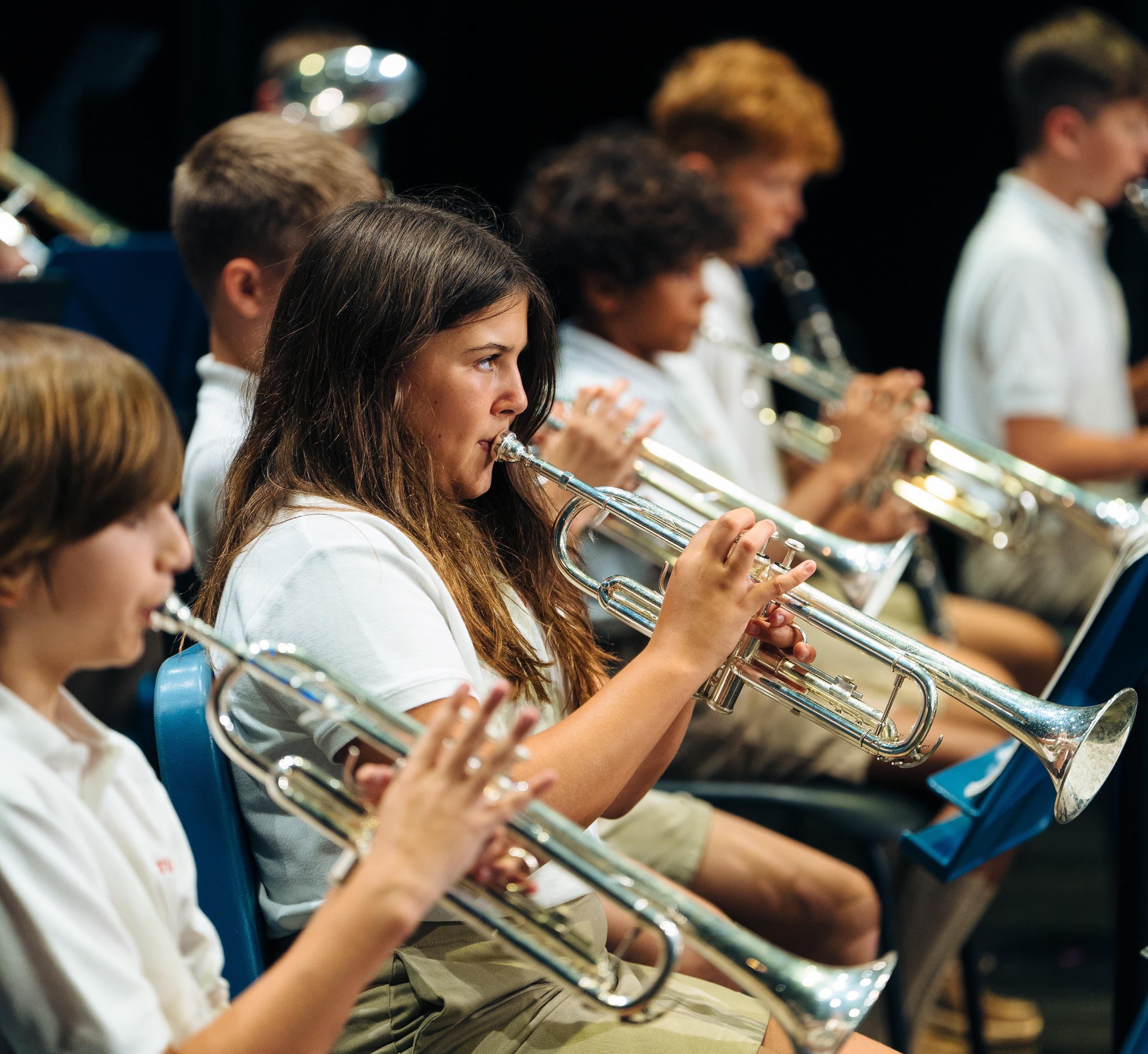
Table
Contents 5 - OUR VISION 5 - OUR MISSION 6 - THE KEY – STRATEGIC PLAN 6 - PORTRAIT OF A GRADUATE 7 - BOARD OF TRUSTEES 8 - LEADERSHIP 9 - HISTORY 9 - HOUSE SYSTEM 10 - CAMPUS DESCRIPTIONS 11 - SCHOOL CALENDAR ACADEMIC YEAR 2023-24 12 - ADMINISTRATIVE INFORMATION • 12 - Tuition and Fees, Additional Fees, Finance Policy & Financial Aid Policies and Procedures 12 - YEARBOOK 12- SUPPORTING OUR SCHOOL 12 - HEALTH AND SAFETY • 12 - Emergency Procedures • 12 - Weather-Related School Closing Information • 13 - Local Field Trips • 13 - International Trips • 13 - Permission Slips • 13 - Medication 14 - SALTUS COMMUNITY ETHICS • 14 - Religion • 14 - Inclusion Statement
14 - Safeguarding: Saltus’ employees’ legal obligation for Mandatory Reporting • 14 - Disclosure of Student Records 15 - USEFUL TELEPHONE EXTENSIONS 16 - SCHOOL DROP OFF • 16 - Procedures 16 - SCHOOL PICK-UP
titles
subtitles to
to
2 0 2 3 2 4 S C H O O L Y E A R
of
•
Click
and
jump
page
17 - VISITING THE SCHOOL
17 - STUDENT DRIVERS
17 - THE ADVISORY PROGRAMME
18 - ASSEMBLIES
18 - SGY COMMON ROOM
19 - STUDENT LEADERSHIP
20 - RECESS AND LUNCH
• 20 - Lunches and ‘Lunch Leave’
• 20 - Hot Lunch Programme
• 20 - The Tuck Shop
• 21 - Personal Belongings
21 - SCHOOL SUPPLIES
22 - SENIOR SCHOOL CODE OF CONDUCT
• 22 - Our Philosophy
• 22 - Responsibility of Students
• 22 - Responsibility of Saltus Staff
• 22 - Responsibility of Parents
• 23 - The Parent/Teacher Communication Process
• 23 - Steps for Parents to Effectively
• Address Concerns
• 24 - Communication with Faculty, Staff,
• and Administration
• 24 - Other Means of Communication
• 25 - Standards, Expectations, and Consequences
• 25 - Progressive Discipline
• 25 - Acknowledgement
26 - ESSENTIAL EXPECTATIONS
• 27 - Discipline Guidance
28 - SECONDARY DRESS CODE & UNIFORM
• 28 - Dress Code
• 29 - Middle & Senior Uniform
• 32 - SGY2 - Business Casual
• 33 -
Secondary - Grub Days
33 - CLASS ATTENDANCE & ABSENCES
• 33 - Attendance Policy
• 34 - Planned Absences
• 34 - Class Attendance
• 34 - Absence Due to Illness
• 34 - Unexcused Absences
• 35 - Lateness
36 - SCHOOL POLICIES AND RULES
• 36 - Academic Integrity
• 37 - Off-Campus Conduct
• 37 - Harassment
• 37 - Identity-Based Slurs
• 38 - Sexual Harassment
• 38 - Bullying and Cyber-Bullying
• 39 - Reporting Bullying
• 39 - Drug and Alcohol Use
• 40 - Unsafe Practices and Possessions
40 - DISCIPLINARY RESPONSES TO MAJOR VIOLATIONS OF THE CODE OF CONDUCT
42 - APPEAL PROCESS
• 42 - Appeals
42 - RESPONSIBLE USE OF TECHNOLOGY
• 42 - Proper and Ethical Use
• 44 - Additional Policies
• 44 - Cell Phones and other mobile devices
45 - CURRICULUM AND ASSESSMENT
47 - EXAMS
48 - HONOUR ROLL
49 - HOMEWORK
50 - EXTRA-CURRICULAR PROGRAMMES
• 52 - Service Learning
• 52 - The Duke of Edinburgh’s Award
53 - GUIDANCE
• 53 - Academic Support and Enrichment
• 53 - School Counsellor
• 53 - University and Careers Guidance Counsellor
54 - PARENT CONNECTION
• 54 - Communication
• 55 - Emails/Telephone calls
• 55 - SaltusLive
• 56 - Profile Updates
56 - PARENT VOLUNTEERS
56 - DIRECTORY
2
Letter from the Head of School

Dear Parents/Guardians of Saltus,
Welcome to a new year at Saltus. Children are born with inquiring minds and they are curious about the world around them. At Saltus we are committed to nurturing that innate sense of inquiry by providing students with learning opportunities that help them to connect with the world. We are committed to empowering our students to think critically, to problem find and problem solve, to collaborate and to know how to access information thereby equipping them with skills to thrive and lead in a global society.
Faculty at Saltus are continually learning and growing through collaboration with all stakeholders. By engaging in ongoing rich professional development, we are continually refining our skills and expertise to empower and teach our students.
The pages of this handbook are filled with important information regarding school policy and procedure. Parents and students should review the contents together. If you have any questions, please don’t hesitate to contact us. We believe that open and clear communication between school and home is vital to your child’s success and to the success of our educational programme.
At Saltus, we believe in the important partnership we develop between the school and our parent community. We welcome your participation in the Saltus Association and in the life of the school. A collaborative effort will enable us to reach our collective goals and celebrate the achievements of our students and school community.
We look forward to working with you and your child and to a wonderful, productive school year filled with rich learning experiences. It is our sincere hope that your child’s learning journey is filled with joy and that your child is empowered to be the very best version of themselves.
Warmly,
Julie Rousseau Head of School

3
Secondary Director’s Message


Dear Saltus Parents and Guardians,
It is my pleasure to welcome you and your child to the 2023-24 academic year at Saltus. Whether you are joining our school community for the first time or have been with us before, we are delighted that you have chosen Saltus as your educational home.
Secondary School encompasses Middle School, Senior School, and the Saltus Graduate Years (SGY). It serves as a transformative phase where our students progress from childhood to adolescence and eventually transition to young adulthood. They learn the art of effective communication, build relationships with peers and adults, and cultivate friendships while also developing conflict resolution skills when needed.
The Secondary School Staff at Saltus thoroughly enjoys working with students across these diverse stages. We are inspired by their unique sense of humour, passion, and unwavering determination to make a positive impact in the world.
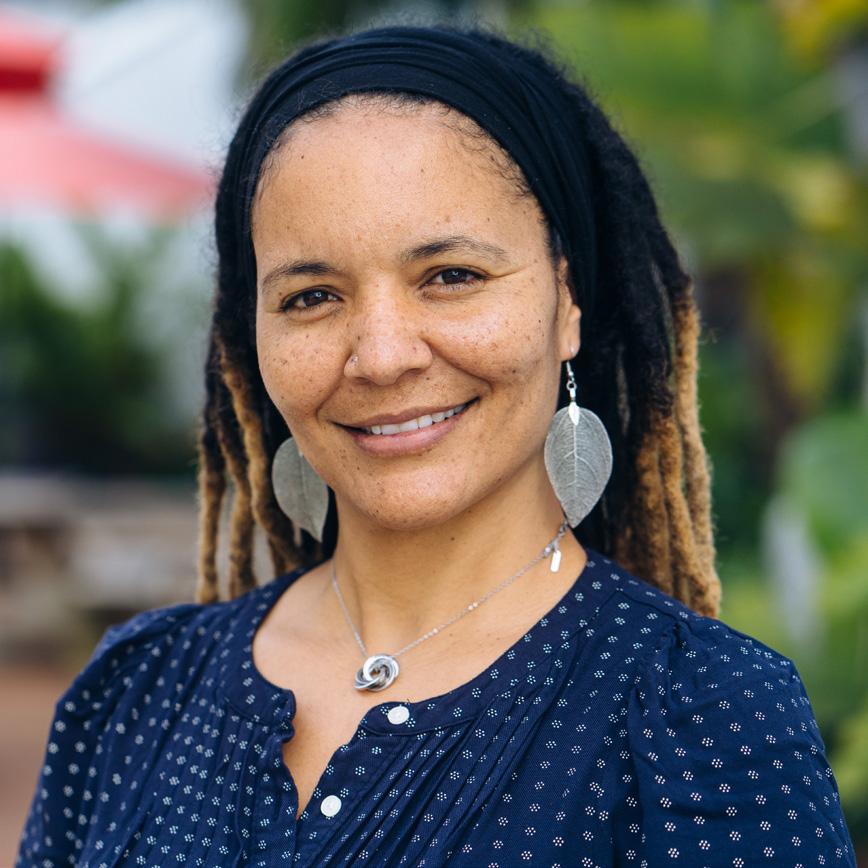
Our Secondary School is not simply a bridge between Primary School and further education; it possesses its own distinct purpose and identity. We strive to create an environment that: Equips our students with the necessary academic and social knowledge, skills, and attitudes to succeed not only in Secondary School but also in higher education and their future careers. Fosters a sense of positive self-worth, self-respect, and self-confidence, instilling in every student
Provides ample opportunities for self-development, decision-making, and taking calculated risks. Offers experiences and activities that promote responsible personal behaviour, individual
We cannot emphasise enough the importance of the partnership between home and school. Open lines of communication are vital, so please feel free to reach out to us with any questions,
We are eagerly looking forward to an exceptional year ahead, filled with growth, learning, and
4
School Community
OUR VISION
Inspiring students to lead us to a more just, fair and sustainable world.
OUR MISSION
To inspire a passion for learning and independent thinking through a commitment to academic excellence, personal integrity and service to others.

OUR VALUES
A school’s unique culture is expressed through values that guide the actions, interactions, and communication of our community including students, staff, and parents. Our values provide shared and consistent expectations for all while also uniting our school. At Saltus, we seek to teach and model our shared values throughout the school community creating a caring learning environment, building character, and promoting positive relationships.
BELONGING
We create a welcoming community where everyone feels included, valued, and connected.
COURAGE
We do not let fear prevent us from exploring new opportunities or facing difficult situations.
EMPATHY
We seek to understand how someone else feels and see things from their point of view.
INTEGRITY
We are honest, responsible, and do what we know is right.
RESPECT
We treat ourselves, others, and the environment with dignity and kindness.
5
THE KEY – STRATEGIC PLAN
Prepare to meet the World
Saltus believes that students are the key to a better future. Our Strategic Plan – The Key – which was released in 2018 comprises four pillars that support the Saltus strategy:
Community – to be the first choice for top faculty and all deserving students. Programme – to assert our place among the world’s leaders in education. Image – to establish an international reputation for innovation and excellence. Stability – to build a solid and stable resource platform.
Our community and our curriculum are engaged with the world beyond, which will ensure that our students are prepared for global challenges. Saltus is prepared to meet the future with a clear vision, a thoughtful approach to tackling challenges, and the determination to take our place among the world’s top schools.
Portrait of a Graduate
The Saltus Difference is orchestrated to bring students through a highly coordinated progression of learning from Foundation Year right through to the end of high school; resulting in a student with skills, intellectual curiosity, academic and social confidence, and a maturity to tackle the challenges put before them. We strive to create students who personify the following:
A GLOBAL CITIZEN who embraces the diversity of culture, language, and values within their local and wider community and whose curiosity empowers them to make a positive impact.
A SKILLFUL COMMUNICATOR who is empathetic listens actively, speaks purposefully, and creates meaningful connections.
PERSISTENT in the face of adversity, showing strength and perseverance in order to achieve their goals.
An ADAPTABLE AND FLEXIBLE LEARNER who thinks creatively, seeks and considers multiple viewpoints, and is equipped to approach complex problems confidently.
A CRITICAL THINKER whose intellectual curiosity prepares them to navigate a fast-paced, everchanging world.
6
Board of Trustees
R. Gil Tucker
Alexander Green
Christopher Coleman
Cortney Bernstein
Douglas Mello ‘90
Jonathan Reiss ‘87
Kevin Dallas ‘96
Robert Cooney
Sacha Simmons
Tammy Richardson-Augustus ‘89
Vanessa Hardy Pickering ‘94
Board Chair; Chair - Diversity, Equity & Inclusion (DEI) Committee; Chair - Risk Assessment Committee
Member at Large
Chair - Finance Committee; Risk Assessment Committee
Saltus Association President, Ex-Officio
Vice Chair; Nominations & Governance Committee; HR Committee
Chair - Building Committee; Finance Committee; Risk Assessment Committee
Advancement Committee Chair
Advancement Committee
Building Committee
Diversity, Equity & Inclusion (DEI) Committee
Diversity, Equity & Inclusion (DEI) Committee
7
The Leadership Team supports the academic and business operations of the School. This team is led by the Head of School – Julie Rousseau, who in turn reports to the Board of Trustees.
Deputy
Director
Director
Director
Director
Director
Director
Assistant
Director
Assistant
Assistant
Deputy
Director
8
of School Julie Rousseau 6222 Julie.Rousseau@saltus.bm
Head
Head Nadia Robinson 6291 Nadia.Robinson@saltus.bm
of People and Culture Crystal Heyliger 6286 Crystal.Heyliger@saltus.bm
of Advancement Denise McAdoo 6264 Denise.Mcadoo@saltus.bm
of Enrolment Management Amanda Skinner 6269 Amanda.Skinner@saltus.bm
of Finance and Operations Paull Davis 6224 Paull.Davis@saltus.bm
of Communications & Marketing Darcy Hausselman 6242 Darcy.Hausselman@saltus.bm
of Primary Jeanne Bean 6324 Jeanne.Bean@saltus.bm
Director of Lower Primary Elizabeth Dowdell 6301 Elizabeth.Dowdell@saltus.bm
of Secondary Cynthia Hassell 6246 Cynthia.Hassell@saltus.bm
Director of Middle School Shayne Scott 6232 Shayne.Scott@saltus.bm
Director of Senior School Lorne Nannini 6279 Lorne.Nannini@saltus.bm
Head (Student Life) Nicole Chichon 6280 Nicole.Chichon@saltus.bm
of Curriculum Jesse Sheppard 6294 Jesse.Sheppard@saltus.bm
Leadership
History
Saltus Grammar School was founded in 1888 thanks to a generous gift from Samuel Saltus who bequeathed the funds for the building of a boys’ school in Bermuda. The school thrived for decades and evolved to include Cavendish Hall in 1972, a second campus devoted to young learners. Many facility enhancements were added over the years, including science labs, libraries, music and art facilities, and a 25-metre swimming pool.
In 1966, post-desegregation in Bermuda, Saltus widened its mandate for diversity and became one of the first multi-racial private schools in Bermuda. In the 1990s Saltus became fully co-educational. The result has been that students enjoy a diverse, real-world learning environment that elevates all.

The history of Saltus is as fascinating as the history of Bermuda itself. To learn more, click here for the full story.
House System
In 1931, when Henry C. Cox was Head of School, he instituted the ‘House System’ using the names of Trustees who had a long association with the School. To this day, Saltus students are still divided into these four Houses: Butterfield (green), Darrell (blue), Watlington (yellow), and Saltus (red). Siblings are placed in the same House and if a parent is an Alumni of Saltus their children will be placed according to the parent’s House. The students will earn points for their House and represent them in Sports Days.
Campus Descriptions

Our Lower Primary (Foundation, Year 1 and Year 2) is located at our Devonshire campus. There are three main buildings that are all connected to the Hall. Foundation Year has its own separate wing with two outdoor playgrounds overlooking the farmlands of Devonshire. Year 1 and 2 classrooms overlook the main field which is a beautiful open space for the students’ PE, recess and, lunch times.
On our St. John’s Road campus, the Upper Primary (Year 3 - 6) is located on the Western side while the Middle School (Year 7 - 9) and Senior School (Year 10 - SGY2) is located on the Eastern side. At the heart of the campus is the beautiful Woodlands Administration Building, which dates back to the 1800s.
The Upper Primary campus has classrooms surrounding an open courtyard with a large Gymnasium/Hall, Library, well-equipped Music Room, and Art Studio. The Middle and Senior campus boasts a state-of-the-art Design Technology Department, a Music Audio Visual Suite with cutting-edge technologies and software, a Black-box Theatre, a large Gymnasium with Fitness Centre, and 6 fully equipped Science labs. Both departments share the use of the 25-meter pool along with the large two-acre field.
School Calendar Academic Year 2023-24
Please note that the dates provided below are subject to change. Please consult the events calendar at www.saltus.bm for updated information as needed.
FALL TERM 2023
Friday, 1st September
Monday, 4th September
Tuesday, 5th September
Monday, 23rd – Friday, 27th October
Monday, 30th October
Tuesday, 31st October
Monday, 13th November
Friday, 15th December
Monday, 18th December – Friday, 5th January
WINTER TERM 2024
Monday, 1st January
Friday, 5th January
Monday, 8th January
Monday, 12th – Friday, 16th February
Monday, 19th February
Friday, 22nd March
Monday, 25th March – Monday, 8th April
Friday, 29th March
SPRING TERM 2024
Monday, 8th April
Tuesday, 9th April
Friday, 21st April
Friday, 24th May
Thursday, 6th June
Monday, 17th June
Wednesday, 26th June
New Student Induction
Labour Day (Public Holiday)
Classes Begin
Half-Term Break
Professional Learning Day
Classes Resume
Remembrance Day (Public Holiday)
End of Term (Early dismissal - ½ day)
Winter Break
New Year’s Day (Public Holiday)
Professional Learning Day
Classes Begin
Half-Term Break
Classes Resume
End of Term (Early dismissal - ½ day)
Spring Break
Good Friday (Public holiday)
Professional Learning Day
Classes Resume
Bermuda Annual Exhibition (Provisional)
Bermuda Day (Public Holiday)
Graduation
National Heroes Day (Public Holiday)
End of Term (Early dismissal - ½ day)
11
Administrative Information
Tuition and Fees, Additional Fees, Finance Policy & Financial Assistance Policies and Procedures
Please refer to our website www.saltus.bm/admissions/tuition-and-financial-assistance for the most current fee structure and financial aid information. If you require assistance, please submit an email request to financestaff@saltus.bm.
Yearbook
Our student yearbook committee produces an annual yearbook – The Martlet. This publication is available for purchase and is added to student school accounts. All Saltus students that are enrolled by Friday, 1st December will be included.
Supporting our School
The Saltus Fund is one of the most powerful ways to contribute to our students’ experience. Tuition covers the essentials – the Saltus Fund takes care of the rest. From financial aid to the staggering variety of academic, performing arts, and athletics options; or the STEM tools that spur learning and innovation – the role of the Saltus Fund is central to each and every student. Saltus asks that every family stretch to make an annual gift to the School so we can continue to offer the breadth and quality of programmes that make a Saltus education so impactful in the present and continues to add value long after our students have moved on. Please contact the Advancement Office if you have any questions about supporting Saltus at (441) 292-6177 or advancement@saltus.bm.
Heatlth and Safety
Emergency Procedures
In line with the Bermuda Government requirements, we carry out Evacuations, Secure Drills, and Hold (shelter in place) Drills at Saltus. During an Evacuation, our students leave the buildings and follow the organised process of lining up at a safe distance on the field. If the situation requires students to leave the campus, they will be well supervised. Conversely, during a Secure Drill, the campus is locked down and our students stay inside classrooms. During a Hold Drill (shelter in place), students are kept in classrooms with business as usual. Staff and faculty training is conducted for these scenarios and our teachers are well-equipped to inform and reassure students as needed.
Weather-Related School Closing Information
In the event of severe weather, closure notices will be posted on www.saltus.bm and there will be an announcement made through the local media outlets and on our social media to inform families of any need to close the School. If School is in session, parents will be contacted via email and students will need to be collected as quickly as possible.
12
Local Field Trips
We have formal School Guidelines for all local trips. These outline all procedures that the Faculty is required to adhere to when taking our students off campus. We ensure that all reasonable safety precautions have been taken to provide the highest standards of safety for our students.
International Trips
International trips are key component of the educational experience at Saltus. They enable our students to build confidence, increase motivation, and expand their worldview. They are opportunities to take their learning beyond the school gates and also help to build stronger teacher-student relationships.

Permission Slips
All permission slips for field trips during the school year will be issued and completed through SaltusLive. Upon logging into your SaltusLive profile, there will be a yellow banner notice alerting you that there are forms to complete.
Medication
All students requiring medication at school must submit a Medication Waiver completed by their parent/legal guardian (form available on SaltusLive). All medications requiring refrigeration will be kept in a school refrigerator and administered by the teacher, office staff, or the First Aid Attendant. Children should never keep medicine of any kind in their lunch boxes. Please note that it is School policy to administer medicine to students only if the exact dosage and time to be taken are clearly written by parents/guardians. This includes rescue inhalers for children with asthma. Some medicines are forgotten at pick-up time so please pour the necessary dosage into a separate bottle or container. Please also be aware that the School does not provide sunscreen. If you wish your child to wear sunscreen, please apply it before he/she comes to school.
Saltus Community Ethics
Religion
Saltus is non-denominational. Saltus offers students the opportunity for reflection on spiritual and ethical matters. While assemblies and holiday celebrations may sometimes reflect the Christian tradition of the School, we respect the religious diversity of the student body.
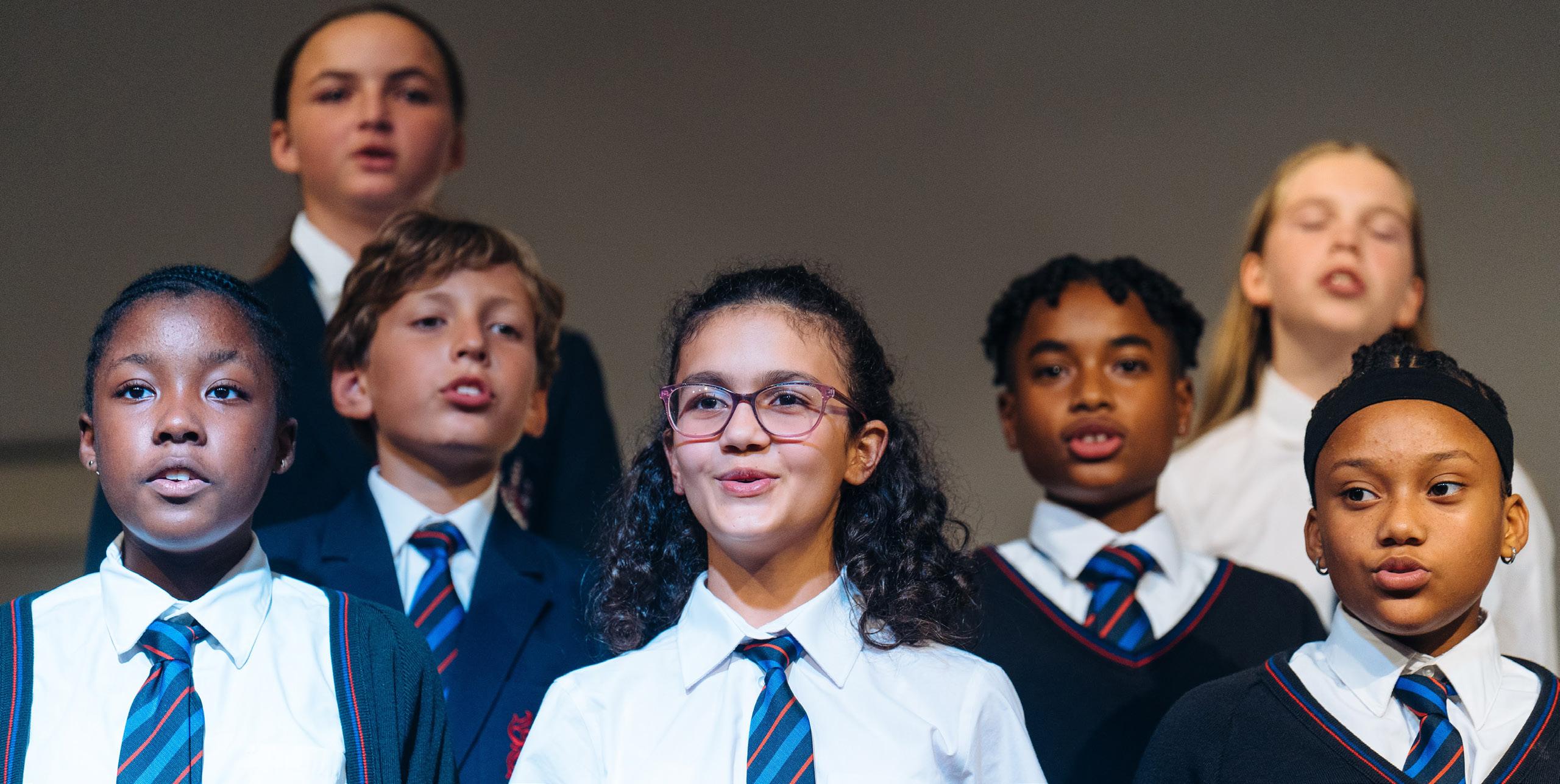
Inclusion Statement
Saltus is committed to establishing a safe and inclusive, equitable, and welcoming environment in which all members of the community are respected and valued and can contribute to and participate in the life of the school. We value intellectual curiosity, and difference and believe that growth and learning can only come from interaction among people with different experiences and worldviews. We respect and value individuals whose differences include but are not limited to, race, ethnicity, national origin, gender expression, gender identity, religion, sexual orientation, or any other aspect of their identity.
Safeguarding: Saltus’ employees’ legal obligation for Mandatory Reporting
Our Staff and Faculty is mandated by law to report any suspected child abuse to the Department of Child and Family Services. If there is any suspicion of abuse, Family Services will be contacted immediately, and they will proceed with the case according to their procedures.
Disclosure of Student Records
The School regards the privacy of all individuals as an important requirement. Our full privacy policy is outlined on our website at www.saltus.bm. If you have any complaint relating to the school’s use of personal information please contact our designated Privacy Officer, Amanda Skinner at privacy@saltus.bm so that we may be given the opportunity to resolve the issue.
14
Useful Telephone Extentions
15
The School telephone number is 292-6177 – Receptionist Cathy Carreiro Director of Secondary School Cynthia Hassell 6246 Assistant Director of Senior School Lorne Nannini 6279 Assistant Director of Middle School Shayne Scott 6232 Deputy Head (Student Life) Nicole Chichon 6280 Senior School Administrative Assistant Dejah Denbrook 6228 Learning Strategist Andree Dugal 6293 After-School / Camps Kallie Marcus Cell:535-8956 School Counsellor Nic Scanlon 6256 School Shop Haley Trott 6285 Database Management Larry Bucher 6287 Director of Finance and Operations Paull Davis 6224 Head of School Julie Rousseau 6222 Executive Assistant to the Head Patra Phillips 6247 Deputy Head Nadia Robinson 6291 Director of Advancement Denise McAdoo 6264 Director of Enrolment Management Amanda Skinner 6269
School Drop-Off
We welcome all Secondary students from 8:00 am when full supervision is in place to ensure a safe and secure start to the day. As soon as our students arrive, they are engaged in numerous activities.
If students have siblings in Upper Primary, please drop them off at Upper Primary during their siblings’ drop-off time.They can then walk back to the Middle School area using the designated crosswalks.
Procedures
Entering at the St. John’s Road entrance, you will drive onto the right-hand side of the road where students are dropped off under the covered porch. Drop-off on the left by the piazza is prohibited. When you exit the school, you will stay on the right-hand side of the road allowing the left-hand side to remain clear for the Upper Primary drop-off. Please do not park, continue driving and exit onto Woodlands Road.
School Pick-Up
Students may be collected at 3:40 pm unless they have been instructed to walk to a location outside of the School grounds. By 4:00 pm daily, students should either:
• Leave the school premises (car pick-up or on foot)
• Work quietly in the Learning Commons
• Attend an extracurricular activity (registration required)
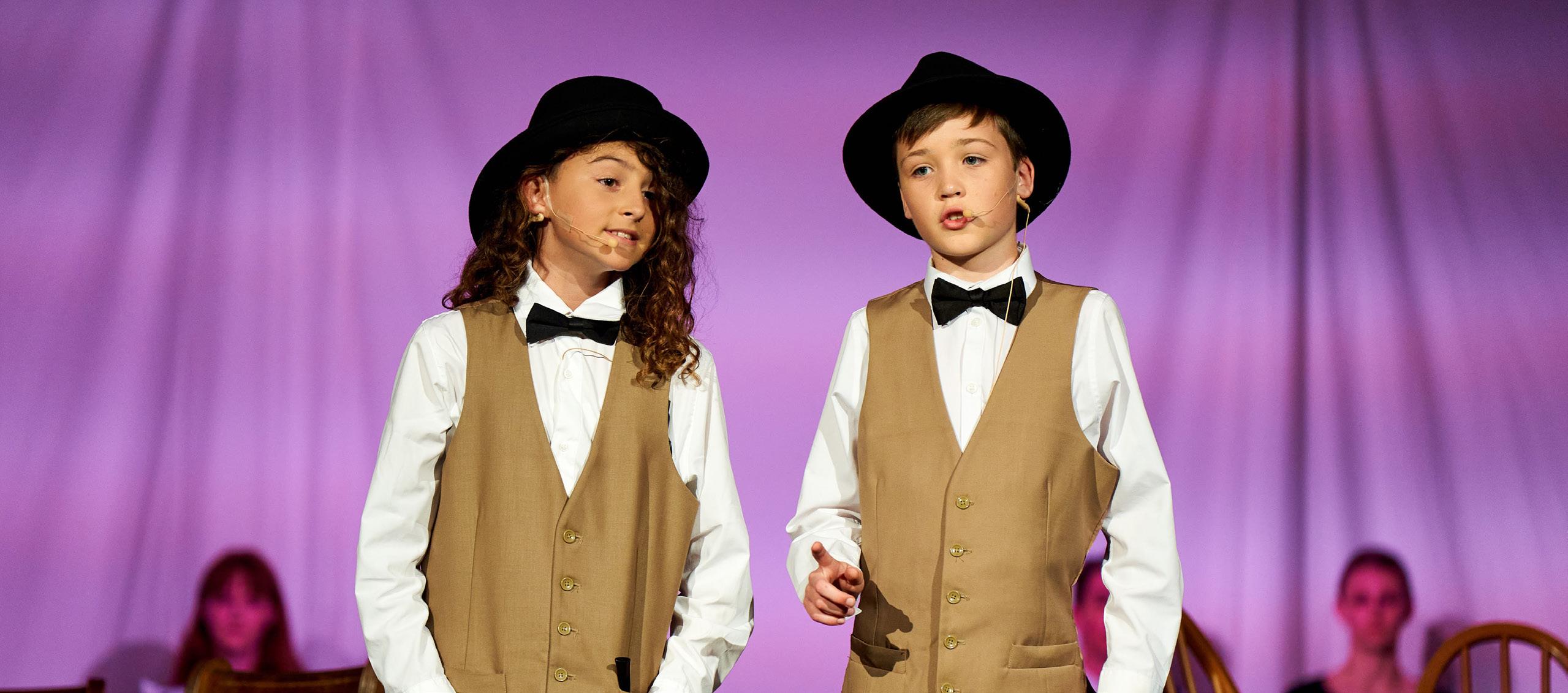
The Learning Commons
After school students have the option to stay and complete homework, study or read in the Learning Commons under the supervision of the Learning Commons staff.
Visiting the School
Temporary One-Way Access Only: Please follow the guidance shared on August 23rd regarding one-way access only to the school due to the partial St. John’s Road closure. Once the road has been repaired, access to the school will be as follows:
When visiting the Senior School between 8:30 am and 4:00 pm, you will enter and exit through the St. John’s Road gates. The security guard will request to see your photo ID and direct you to reception. Once at the office, you will be asked to sign in and be issued a visitor pass which must be worn at all times while on campus. Please return to sign out and return your visitor’s pass when leaving the campus. If you are taking your child(ren) with you then they must also sign out when you leave.
Student Drivers
Our policy regarding student-driven vehicles is to ensure the safety of everyone while meeting the needs of those families who rely on the convenience of a student-driven vehicle.
No students are permitted to bring cars onto the campus. Students who are 16 years or above are permitted to ride motorbikes to and from school. The following points must be followed to ensure the safety of student riders and the school community as a whole:
1. Students are asked to register vehicles that will be driven to school with their advisor. A record of student registration plate numbers will be kept by the Deputy Head (Student Life).
2. Students are to ride in a safe manner at all times and be mindful of themselves, others, and the wider school community.
3. Students must park in the designated bike parking bays on campus. Students should not be parking their bikes on roads neighbouring the school such as Euclid Avenue given the fact that these inconveniences our neighbours going about their daily business.
4. Students must use the one-way system in place at all times. During the period from 3:30-4:00 pm, students are not permitted to leave the campus via the St. John’s Road entrance. This goes against the flow of traffic and is dangerous.
5. In accordance with the law, students must not have ‘pillion passengers’ unless the driver is 18 years of age.
6. Students are not to make modifications to their bikes such as the use of ‘kits’. These often increase the noise emitted by the vehicle and disturb the school community.
The School reserves the right to ban students from driving vehicles to school if they are in contravention of any of the above points.
17
The Advisory Programme
Independent schools such as Saltus place a great deal of emphasis on teacher-student advisory relationships. The Advisory Programme is designed to help our students with social, emotional and intellectual development.
Advisory groups meet daily and once a week for a longer 35-minute period. Through this Programme students meet regularly in a small group with their advisor to discuss academic and school life issues. Students set academic goals, as well as talk about co-curricular and community service involvement. With the help of their advisor, students revise these goals throughout the year.
Advisors will remain with their advisory group as they progress through the Secondary School. This ensures they develop a strong bond and have a good understanding of their students’ progress.
SGY2 advisors are tasked with writing a student’s university recommendation in conjunction with the School’s University Guidance Counsellor.
Assemblies
Assemblies will take place once a week. These provide an opportunity for students and staff to recognise achievement, receive information, hear a speaker or view a presentation on a variety of topics. All students are expected to attend assemblies and will be monitored by their advisor at such events. These assemblies will be supplemented by year group meetings as well as advisory lessons.
SGY Common Room
The Goose Gosling Centre is an excellent facility. The Reiss Centre (SGY Common Room) was purpose-built to accommodate the SGY programme. It is expected that all students using the facility will use it with a sensible and mature attitude.
The same courtesy and consideration are also to be afforded to the collaboration space/hub within the Gibbons Centre next to the SGY Common Room. All students are expected to contribute to the wellbeing of these areas and to tidy up after themselves. Any students who damage or litter the communal areas will have to make good any damage and will lose the privilege of using the facility for a designated time.
These spaces were designed specifically to foster a sense of community within our Saltus Graduate Years (SGY) programme. The aim was to provide a space where students can work and socialise while also introducing them to the concept of student centres that are found in most universities and institutions of further education.
18
Student Leadership
Saltus offers opportunities for students at all levels to reach beyond their comfort zone and try their hand at taking charge. They learn how to be a true leader – one who inspires through collaboration and creative problem solving from day 1, whether it is ‘line leader’ in Foundation Year, Music Prefect in Year 6, or as a Senior Prefect in Senior School every student gets a chance to shine. Building confidence, resilience and decision-making skills are just some of the key takeaways that bolster their readiness for university and beyond. Students are expected to act as role models and to fulfil their duties in line with the expectations of their given position.
Senior Prefects are provided with a staff liaison who help them refine their job descriptions, and set challenging goals and expectations.This leadership model helps ensure that students are fully prepared for university and the world of work. Further information about our student leadership model and opportunities to lead can be found on the resource tile on SaltusLive
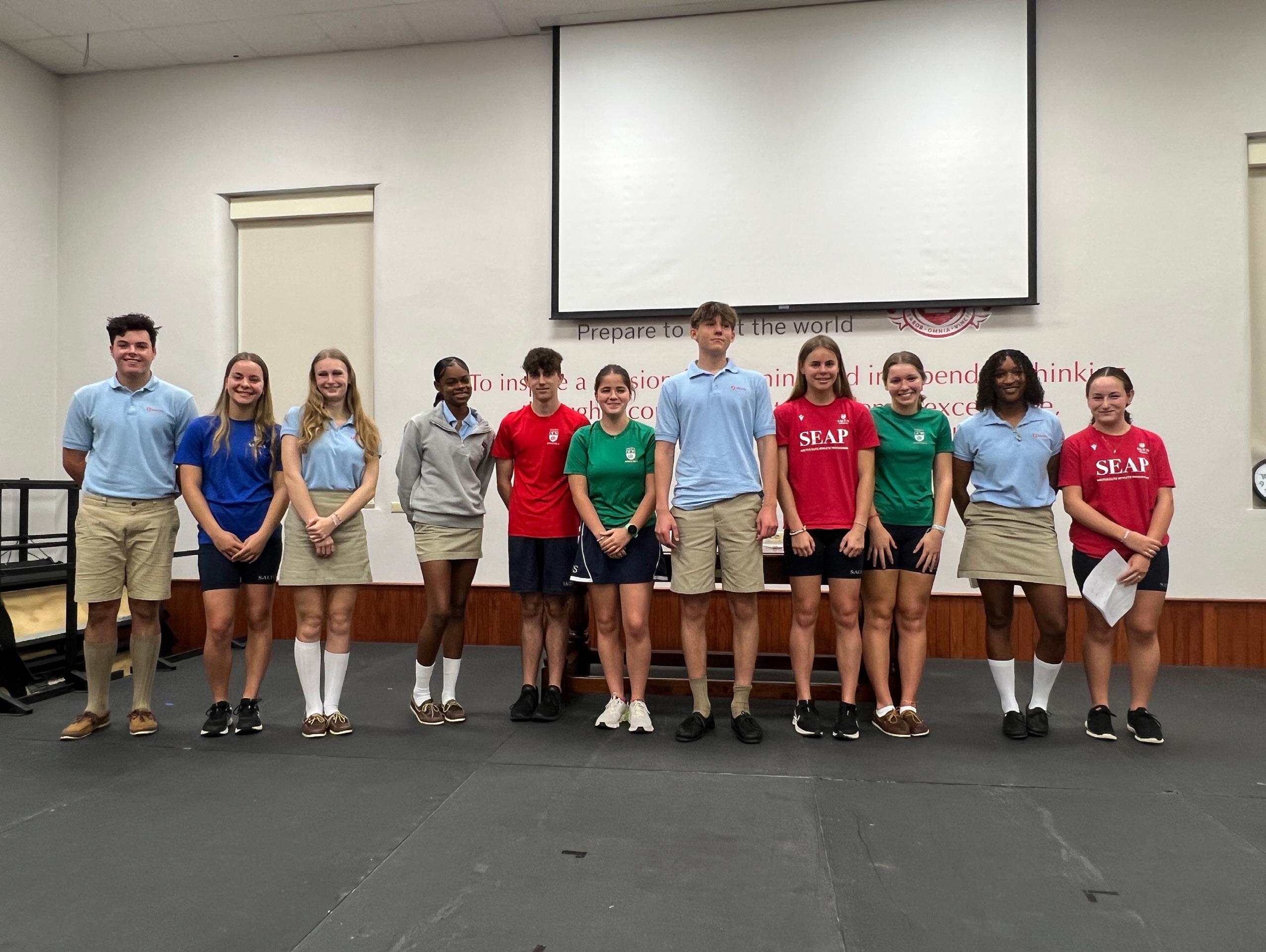
19
Recess and Lunch
Students are encouraged to bring healthy choices for lunch and recess to school each day. Microwaves are available for students on a first come first serve basis.
Lunches and ‘Lunch Leave’
Year 7 - 11 students will stay on the school premises during recess and lunch. SGY2 students, with a signed permission form, may leave the premises and lunch, unless they have designated activity, but must ensure that they sign out when they leave. They are also expected to return at least 10 minutes before the start of their next lesson and sign in when doing so. Parental permission will be required for any student leaving campus. The Upper Primary Department, including the part of the drive alongside Woodlands, and the field including the play equipment, is out of bounds to students in the Secondary School.
Hot Lunch Programme
Hot lunches are available through La Trattoria lunch programme. Order forms for the hot lunches are sent home at regular intervals throughout the year and students may only obtain lunch if they are signed up online.
For the academic year 2023-24, students who sign up for a hot lunch at the School (Upper Primary and Secondary) should purchase a “BPA free” lunch container (which is portioned). These containers are a part of the 02GO ecological product line, and include a reusable knife, fork, and spoon. They are available from the School Shop or reception at a cost of $16.
Once La Trattoria receives the hot lunch order form (shared via email) they will enter your choices in a database that will give them the names of those having lunch that day. All your child(ren) will have to do is leave their Bento Box in our hot lunch serving area and lunch will be served. If your child is unable to attend school, simply send La Trattoria an email (manager@trattoria.bm) the day before or in the morning before school starts so that food will not be sent for them, this way food will not get wasted. Your credit will then be rolled over into the next academic term.
After eating their lunch, students bring the box home and return with it the next time they are scheduled to have lunch. Only one lunch box will be issued per student and if they lose the box then parents are to supply another food container. The same is true if the cutlery is lost.
On the odd occasion that a student has simply forgotten their box, they will be served in a non-plastic disposable container. This will be monitored. Replacement cutlery is available for an additional fee. Proceeds will go to Eco club.
The Tuck Shop
La Trattoria services a canteen for students who wish to purchase lunch or snacks on a daily basis. The canteen is located inside the Secondary building where a menu and the price list are displayed. As an example of options, you may find sandwiches, salads, soups, wraps, muffins, and popcorn.
20
Personal Belongings
Please ensure that all belongings are clearly named. If your child has lost any items, there are ‘lost and found’ locations in each Department.
School Supplies
Senior School students are each provided with a lock (for their locker). Each student is required to purchase a School laptop, although SGY students are given the option of signing up for the BYOD (Bring Your Own Device) programme. In order to utilise this facility students should obtain a BYOD form from the School Help Desk.
Students are required to purchase the following supplies:
• Laptop case *
• Earbuds/headphones *
• Lock for locker*
• Black or blue ballpoint pens
• Pencils
• Eraser
• Highlighters
• Coloured pencils
• Pencil sharpener
• Pair of compasses
• 30cm ruler
• Calculator
• Protractor
* Please note that those items marked above may be purchased at the Saltus Shop
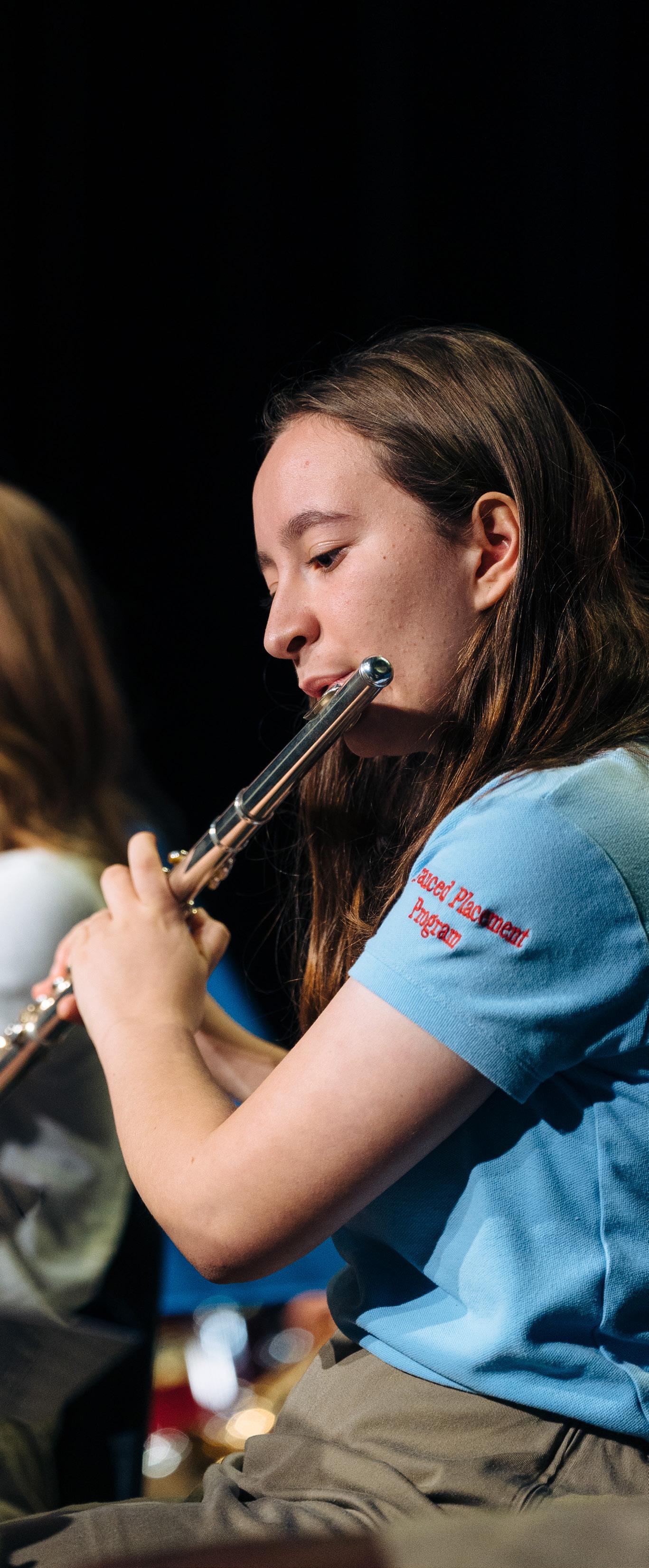
21
Secondary School Code of Conduct
Our Philosophy
Saltus relies on the mutual respect of all community members, including a genuine concern for the emotions, possessions, and personal rights of all persons. Implicit in this statement is the importance of honouring differences in individuals and allowing the development of everyone’s potential within the context of community responsibility. Saltus can achieve its collective goals only if all its members respect one another. This philosophy is underpinned by the need to ensure the safety and continuation of the community and to maintain an environment where learning and trust are of the utmost importance.
One of the most successful ways to encourage good behaviour and strong academic achievement is through positive reinforcement. In the Middle and Senior school, we will actively encourage students to develop self-discipline and self-regulation to maintain our School’s positive learning atmosphere. Our goal is to help young people understand what it means to be responsible citizens. Part of that education is recognising that actions can negatively impact others. We will work with students to support their understanding of, and adherence to the expectations. At the same time, we understand that adolescents, like adults, may make mistakes, and will therefore also establish a system of progressive discipline.
Responsibility of Students
Students are responsible to know, understand and follow the expectations outlined in our Code of Conduct regarding school rules, regulations, and guidelines. Students will contribute to a supportive, respectful, and inclusive learning environment and will maintain positive relationships with their peers, faculty, and staff.
Our Code of Conduct emphasizes positive behaviours, and this extends to all possessions, personal rights, and areas within our school. The buildings and property of the school should be respected and valued.
Responsibility of Saltus Staff
Saltus Staff will provide a safe, respectful, and inclusive learning environment that supports the whole child. At the core of a caring learning environment lies a studentcentered programme that supports the needs of students and enriches their full development as learners. Faculty and Staff will communicate expectations in a productive manner with students and parents. Staff will seek to promote reflection, responsibility, and behaviour for learning. Central to our approach to discipline is the belief in maintaining student dignity. Staff will endeavour to support the whole child, providing them with opportunities for reflection, ongoing growth, and a sense of responsibility. When it becomes necessary to apply progressive discipline, Staff will demonstrate consistency and fairness.
Responsibility of Parents
A strong partnership between the School and parents/guardians serves as an essential foundation in supporting our students. Parents are expected to review the Code of Conduct with their child(ren) to ensure that they understand the expectations. Parents are important role models for their children and as such are expected to address concerns and issues in a respectful and productive manner with Saltus Faculty and Staff as well as with other parents, students and stakeholders.
Open dialogue and communication between the home and the school is actively encouraged as it serves to strengthen partnerships. If concerns arise, we ask that parents address issues following clear lines of communication.
22
LINES OF COMMUNICATION
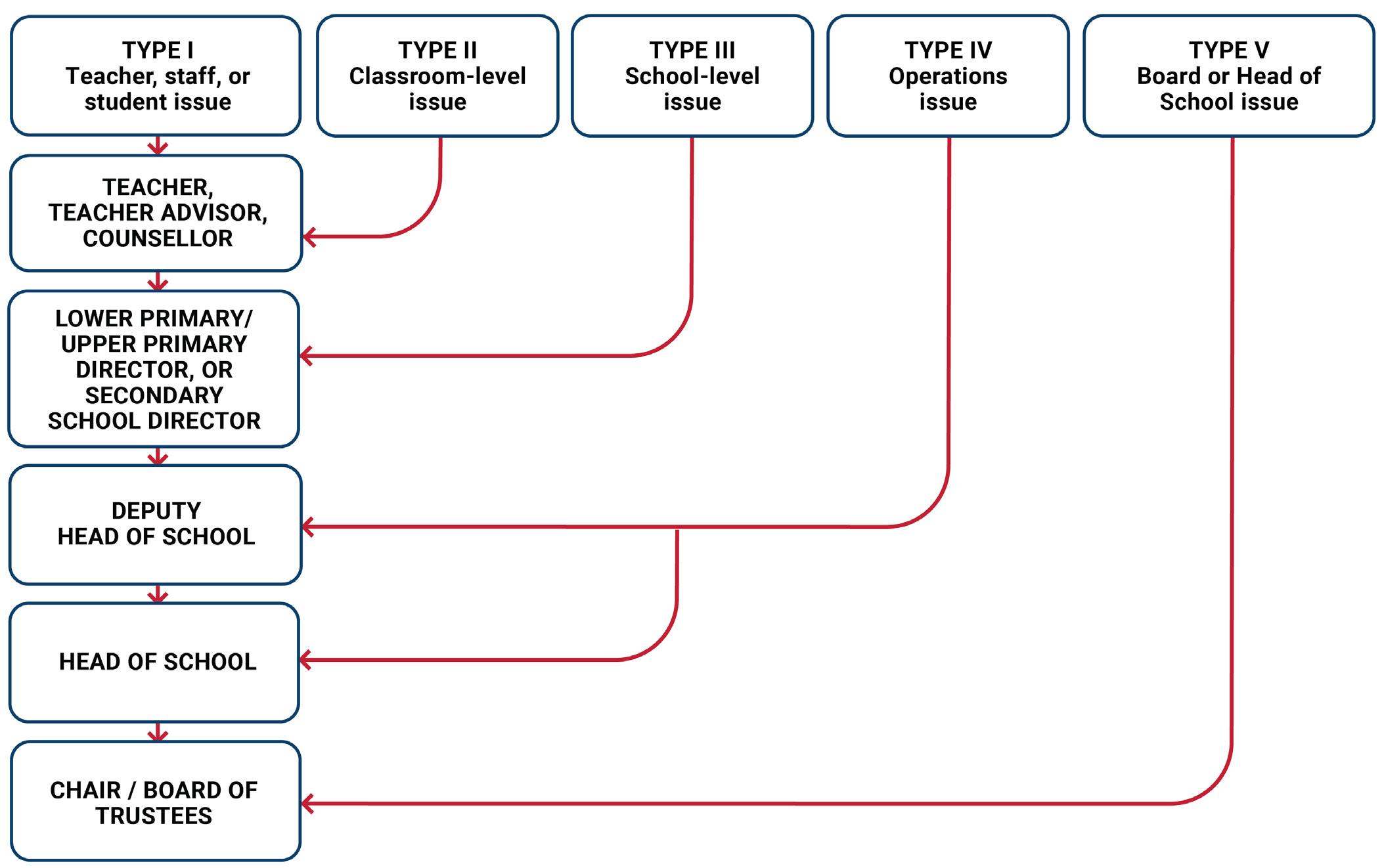
The Parent/Teacher Communication Process
a. Identification of a concern by a teacher/ staff member
When there is identification of a concern by a teacher, contact will be made with a parent as soon as possible within 24 hours if possible.
Some examples include:
• Irregular attendance – chronic lateness and/ or unexcused absences
• Consistent academic difficulty
• Consistent non-completion of homework
• Noticeable drop in academic standing
• Serious academic or behavioural difficulty
• Violation of the Code of Conduct
In general, faculty and staff may communicate using an email, a phone call, or may request a face-to-face meeting.
b. Identification of a concern by parents When a parent communicates a concern to a teacher, a response to an email or a voicemail
will be made as soon as possible and, if possible, within 24 hours during a school week, or upon return from a weekend or holiday. If you would like to arrange a face-to-face meeting with a teacher, please remember to request one in advance.
Steps for Parents to Effectively Address Concerns
At Saltus, we strive to work collaboratively to resolve issues in a productive manner. As such, it is crucial for concerns to be addressed in a proactive and respectful manner. We ask that parents follow the lines of communication below to address concerns.
• Step 1: Parent communicates with the teacher/ staff member
For classroom-related concerns, parents are asked to communicate with their child’s teacher first to discuss the issue(s) that remain(s) unresolved. Most issues can be resolved at this stage without the involvement of the Director
23
or Assistant Director of their respective School (Middle, Senior or SGY). Our teachers care for the success of all students and as such seek to find solutions and strategies to address concerns raised by parents.
• Step 2: Parents communicate with the Director or Assistant Director of their respective school (Middle or Senior)
Following Step 1 should the issue remain unresolved, parents may choose to inform the Director or Assistant Director of Middle/Senior/ SGY School who will ask if the preceding steps have been taken before addressing the matter. The Director will seek to collaborate with all parties involved to resolve issues as we are all partners in your child’s education.
• Step 3: Parent communicates with the Deputy Head of School
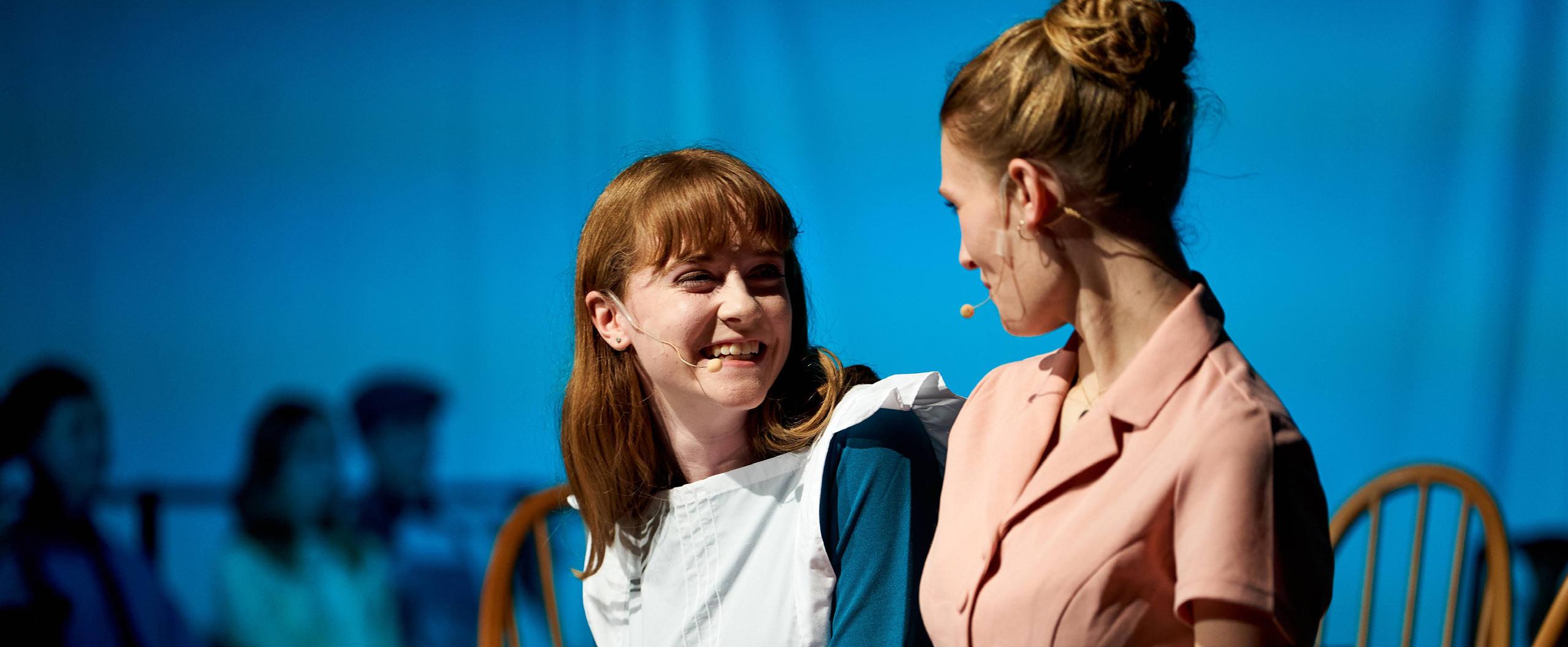
Should the issue remain unresolved following the two previous steps, parents may choose to inform the Head of School. Parents are asked to make an appointment through Patra Phillips, the Senior Executive Assistant to the Head of School, at patra.phillips@saltus.bm.
Communication with Faculty, Staff, and Administration
Effective communication is key to establishing and maintaining positive partnerships to ensure
your child’s success. At Saltus, we expect our parents to be supportive of the mission, and vision, of the School. Following the lines of communication outlined above, we encourage parents to share their concerns with faculty, staff, and/or administration when the need arises.
We respectfully advise that the use of email, while timely, can be easily misinterpreted. When contacting faculty, staff or administration, please note that some matters are best communicated in person. Please be aware that any harassing or disrespectful comments directed at any member of the Saltus community via email or in person will not be tolerated. We would be pleased to schedule a personal meeting with you to discuss your concern at your convenience and remind you that any issues related to your child’s academic performance should first be addressed with their teacher.
Other Means of Communication
• Parent-Teacher interviews
• Parent-Teacher conferences
• Curriculum information evenings
• Meetings by request
• Parent Coffee Mornings
• The Week Ahead newsletter
24
Standards, Expectations, and Consequences
Students and Staff have a right to work and study in an atmosphere that is free of any form of harassment or intimidation and we all share a responsibility for ensuring that such an environment always exists. Central to our philosophy is the expectation that students will respect the school environment and each other.
Progressive Discipline
Students are at various stages of learning acceptable behaviour, and, in some circumstances, positive practices may not be effective to address inappropriate student behaviours. At Saltus, each individual is responsible for their own actions and behaviour and is expected to be a good citizen. Discipline is a formative process of development, not just a tool to be used in times of misbehaviour. Discipline is achieved when the members of the school community are clear about the rules and guidelines within which they learn and when they feel comfortable about the structures within which they operate.
Monitoring and upholding school rules and the Code of Conduct, as well as the imposition of disciplinary action, are the responsibility of:
• Director of Secondary and Assistant Director of Middle School
• Director of Secondary and Assistant Director of Senior School
• Head of School and Deputy Head of School
The above and their designates who consult with students, staff, parents, and others as deemed appropriate.
A progressive discipline approach will be used to deal with inappropriate behaviour. Progressive discipline is an approach that makes use of a continuum of interventions, supports, and consequences that builds upon strategies to promote positive behaviours. Saltus supports the use of suspension and expulsion for serious incidents. Before considering whether to impose a suspension or expulsion, the Head of School and Deputy Head of School will consider all relevant and mitigating factors.
While, in general, the severity of the consequence and the positive steps taken by the school will be consistent with the nature and degree of the misbehaviour, each case will be dealt with individually. No two misdemeanours are exactly alike, nor are the needs of those who caused harm necessarily similar. Fairness and equity do not automatically equate to identical consequences or interventions. We recognise that each student is a unique individual and that every situation that requires disciplinary action has its own set of extenuating circumstances. All factors that may have affected the student’s behaviour will be considered throughout the progressive discipline process. Students who cause harm will receive an age and developmentally-appropriate consequence.
Progressive discipline may include interventions and consequences such as:
• Review of expectations
• Warnings
• Notification of parents/guardian
• Restricted privileges
• Behaviour contract
• Restorative practices which include reflective practice and the opportunity to grow
• Referral to counselling and/or consultation,
• Withdrawal from class (in-school suspension, short-term out-of-school suspension, longterm out-of-school suspension)
• Expulsion/dismissal
In all circumstances, the school will endeavour to gather facts and information regarding the student’s behaviour and/or issue. Students will be treated with fairness and as individuals and the unique aspects and circumstances of each situation will be considered carefully within the overall framework of consequences and consistency of expectations, as outlined in the Code of Conduct.
Acknowledgement
Students and parents are expected to review this Code of Conduct policy and acknowledge in writing that they are aware of, and accept, its content, through the School form on SaltusLive
25
Essential Expectations
At Saltus our students:
• Understand and follow expectations set out in the Code of Conduct
• Have the right to feel safe in all learning environments and experiences both on and off campus
• Set respectful boundaries for themselves while being considerate of others
• Strive to interact with others respectfully and seek to resolve differences or issues in a productive manner
• Respect the diversity of their peers, and of members of the local and global community, by practising active listening, empathy and kindness
• Demonstrate respect and care towards themselves, peers and the school environment
• Demonstrate a willingness to engage in their learning
• Demonstrate academic integrity
• Demonstrate digital citizenship and follow the guidelines outlined in the responsible use of technology
• Are punctual and come to school prepared for their learning
• Understand and follow the school uniform guidelines and present themselves with pride
• Report dangerous or uncomfortable situations to faculty or staff immediately
• Seek help and/or assistance from staff
As outlined above, Saltus has clear expectations related to student behaviour. Central to these expectations is the assumption that students will respect the school environment and each other.
The following constitutes unacceptable behaviour:
• Chewing gum
• Poor behaviour on the field
• Failure to follow a classroom rule
• Repeated incomplete assignments
• Inappropriate language
• Inappropriate use of technology including cell phone, air pods etc.
• Inappropriate or incomplete uniform
• Frequent tardiness
• Teasing
• Unauthorised leaving of school grounds
• Lying or cheating
• Bullying, cyber-bullying, discrimination, and intimidation
• Being rude or disrespectful to peers, staff and visitors
• Exhibiting any behaviour that detracts from the learning of others
• Use, possession, or distribution of alcohol, drugs, e-cigarettes (vaping), or being under the influence of alcohol, non-medicinal drugs in any form including edibles when
attending school related functions (e.g., dances, excursions, sporting events). There is no smoking/vaping of any kind on school property or when attending school-related events whether students are in uniform or not
• Inappropriate representation on social media platforms
• Vandalism
At Saltus, we strive to provide a safe and caring learning environment. Caring environments are free from:
• Bullying, cyber-bullying, harassment, and/or marginalisation
• Threats and intimidation
• Violence in any form
• Discrimination in any form including race, colour, gender, religious beliefs, disability, sexual orientation, ancestry, or national origin
26
• Retribution against a person who has reported incidents
• Abuse in any form
Discipline Guidance
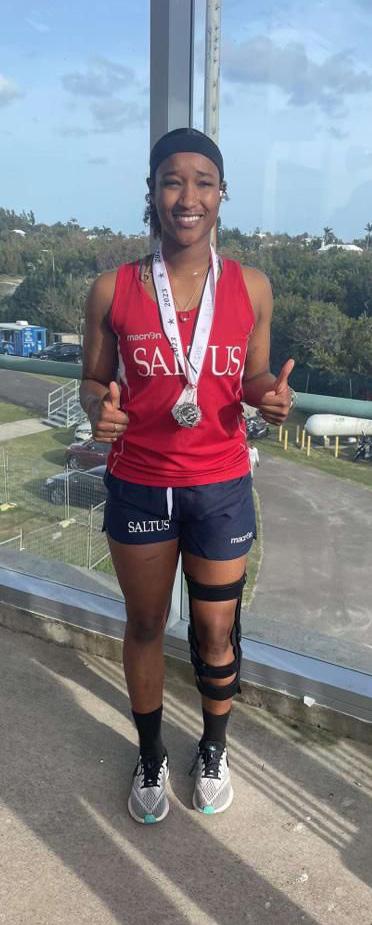
The following steps serve to provide guidance for progressive discipline.
• Step 1: Polite Warning
The teacher will speak to the student about their behaviour and will offer suggestions for improvement. This will be considered a polite warning.
• Step 2: Official Note
The teacher will speak to the student and will send a follow-up ‘Official Note’ documenting the conversation. A copy of the note will be sent to both the parent/ guardian and the advisor.
• Step 3: Meeting with Assistant Director
If the behaviour continues unabated, the student will be required to meet with the Assistant Director and attend (one or more) reflection sessions. This is at the discretion of the Assistant Director based on circumstances (including frequency and mitigating factors).
• Step 4: Parent Meeting
Parents will be asked to participate in a meeting with the Assistant Director, the student, and other appropriate parties to discuss a plan of improvement.
This may include regular conversational check-ins which may be with the Assistant Director and/or the School Counsellor.
• Step 5: Escalation of Consequences
Repeated violations after the meeting referenced above will result in an escalation of disciplinary responses as referenced in the ‘Major School Rules’ section of this handbook.
Secondary Dress Code & Uniform
The following outlines expectations regarding dress code and uniform. Exceptions can be made at the discretion of the Head of School with respect to the needs of the individual. Such accommodations may be related to cultural or religious needs, body type needs, medical requirements, and/or disability.
The Saltus School Shop is located on Woodlands Road and supplies all uniform pieces as well as other specialty items. The shop will be open Mondays, Wednesdays, and Fridays by appointment only. Our Saltus Shop is also available online for your convenience.
The School supports many charities and events which usually result in one to two ‘Grub Days’ a term where students may dress in their casual clothes.
Dress Code:
• Students should wear their uniforms in a respectful manner
• Shirts should be tucked in, including to and from school
• Ties should be worn properly
• Pants/trousers should be worn correctly and be school appropriate (combat or cargo style are not acceptable)
• Skorts should not have pleats/pockets or buttons
• The Saltus ¼ zip sweatshirt may be worn,
• Students are permitted to wear a wristwatch
• Students are permitted to wear two small plain studs max per earlobe, small hoops, and a single bracelet. Single cartilage studs are permitted.
• Nose piercings are acceptable but studs only not hoops
• Natural-looking make-up, polish or nails are acceptable
• Bracelets are not permitted save for Medic-Alert bracelets (Safety reasons in sport)
• Hair should be neatly groomed. Longer hair will be required to be tied back for practical subjects for safety reasons.
• Natural hair coloring is acceptable
• Hats may be worn on the field during the hotter months
• Aprons/lab coats are required for Design Technology and Science but will be provided
• School shoes should be black or brown polishable (not sneakers)
28
Middle & Senior Uniform
Year 7 – 11 Uniform
Shirt Saltus white or navy polo shirt
Trousers/Skort Khaki shorts, long khaki trousers, khaki ‘A’ line flat front skort
Knee-high length khaki or white socks with shorts or skorts
Socks
Short white or khaki socks with with long trousers
Shoes Black / brown polishable
Belt (if needed) Black / brown
Hair ties/ bands Solid red / white / navy blue / black / brown
Sweater (optional) Navy blue Saltus sweater / vest / cardigan Saltus ¼- zip sweatshirt
Year 7 – 11 # 1 Dress Uniform – to be worn in assembly, with guest speakers & when representing the School, for example. Notice will be given when #1 Uniform is required.
Shirt White button down
Tie Saltus tie
Trousers/Skort Khaki shorts, long khaki trousers, khaki ‘A’ line flat front skort
Socks
Knee-high length khaki or white socks with shorts or skorts
Short white or khaki socks with long trousers
Shoes Black / brown polishable (no sneakers)
Belt (if needed) Black / brown
Hair ties/ bands Solid red / white / navy blue / black / brown
Blazer Navy blazer with Saltus Crest
29
PE Uniform
Navy Saltus P.E. shorts, bike shorts or skort
Saltus T-Shirt in House colour
White ankle length socks
Proper athletic shoes (non-marking soles and no high tops, ‘slides’ or crocs)
Red Saltus #4 shirt (required for external events)
Saltus Track Suit (used on cold days, inter-school and community events)
Suitable P.E. bag
Swim attire: swim shorts (blue, black or red), one-piece swimsuit (blue, black, red), sun shirt, goggles, swim cap (for longer hair) and towel
*Note: Hoodies are not part of the school uniform and should not be worn at school.
SGY1 and SGY2 Uniform
Shirt
SGY polo shirt (light blue)
Trousers/Skort Khaki shorts, long khaki trousers, khaki ‘A’ line skort
Socks
Shoes
Knee-high length khaki or white socks with shorts or skorts
Short white or khaki socks with long trouser
Black / brown polishable (no sneakers)
Belt (if needed) Black / brown
Sweater (optional)
Saltus sweater / vest / cardigan
Saltus ¼- zip sweatshirt
30
SGY1 & 2 #1 Dress Uniform – to be worn in assembly, with guest speakers & when representing the School, for example. Notice will be given when #1 Uniform is required.
Shirt Light Blue button
Tie Saltus SGY2 tie
Short or long khaki trousers
Trousers/Skort
Socks
Khaki ‘A’ line skort / skirt
Knee-high length khaki or white socks with shorts or skorts
Short white or khaki socks with long trousers
Shoes Black / brown polishable
Belt (if needed) Black / brown
Blazer Navy blazer with Saltus Crest

*Note: Hoodies are not part of the school uniform and should not be worn at school.
YEAR 7-11 #1 UNIFORM

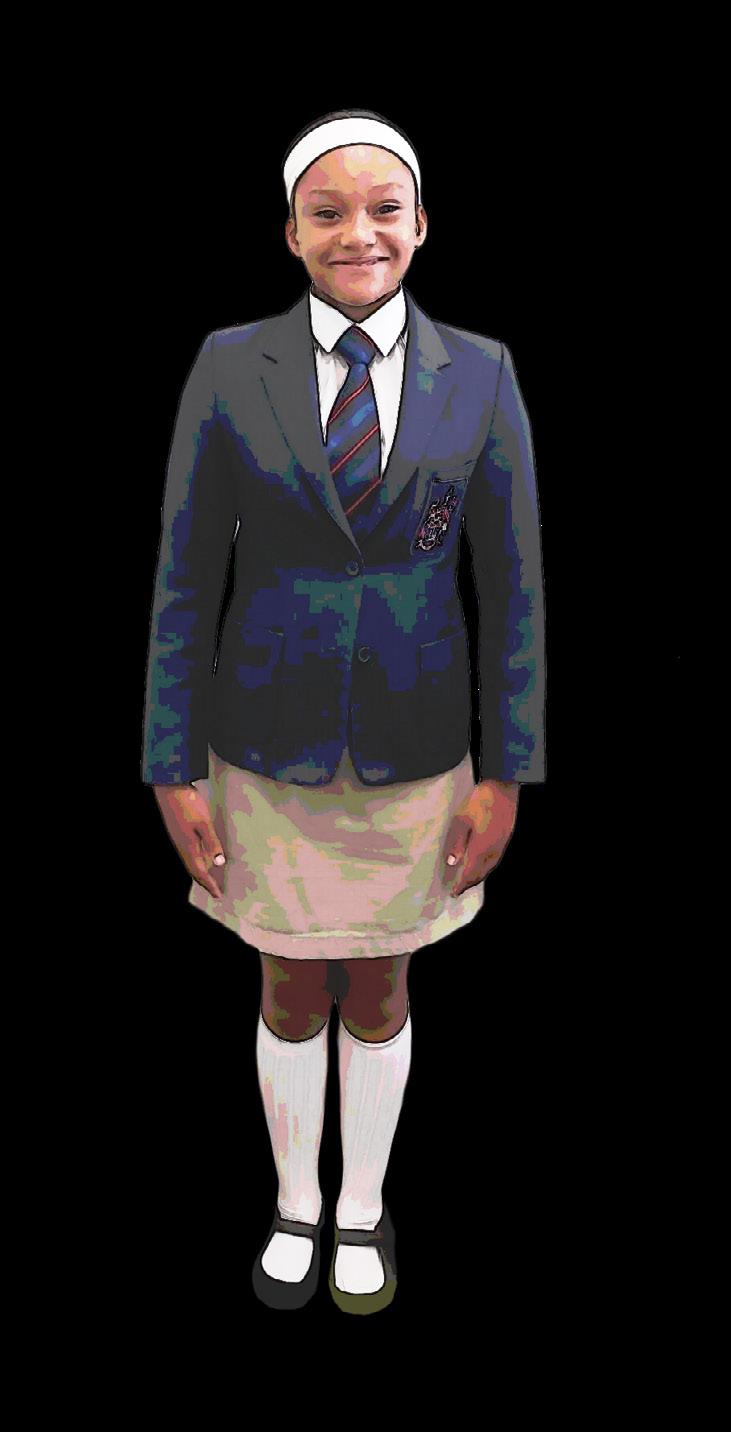
SGY1 AND SGY2 #1 UNIFORM

31
CARDIGAN AND REGULAR UNIFORM

SGY2 - Business Casual
On Mondays, SGY2 students are permitted to attend school in business casual, professional attire. Students should dress as if they were spending the day in a professional working environment. This is a privilege and students are expected to abide by the following guidelines:
• Shirts must have a collar
• Saltus ¼-zip may be worn
• Denim may be worn, but cannot be overly baggy or ripped
• Clothing must be professional in style and school appropriate
• Rubber flip-flops / ‘slides’ are not permitted. Students needing a different shoe due to a medical accommodation will be asked to provide a medical note
• No sports leggings
RED SALTUS TRACKSUIT AND PE UNIFORM
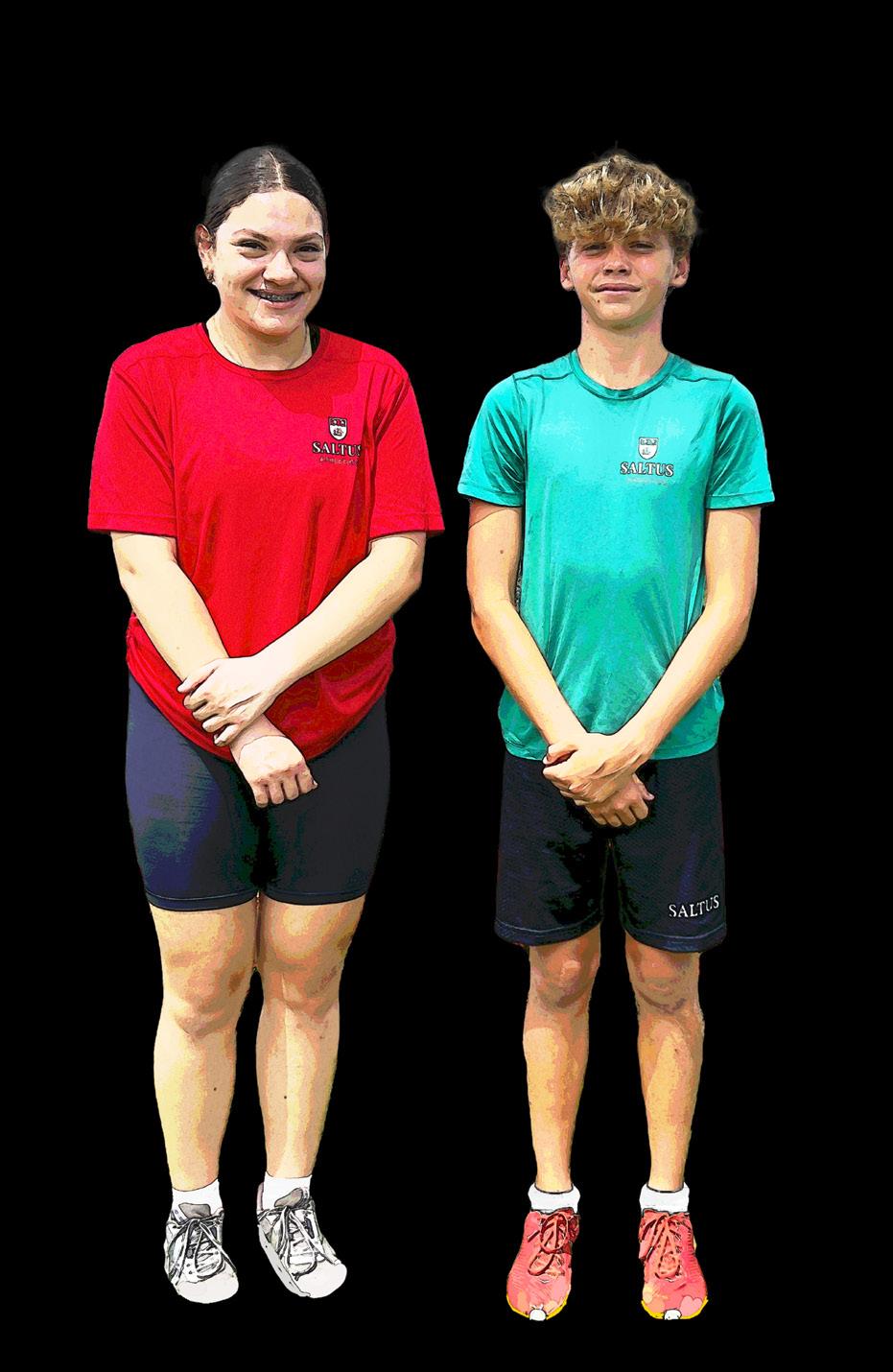
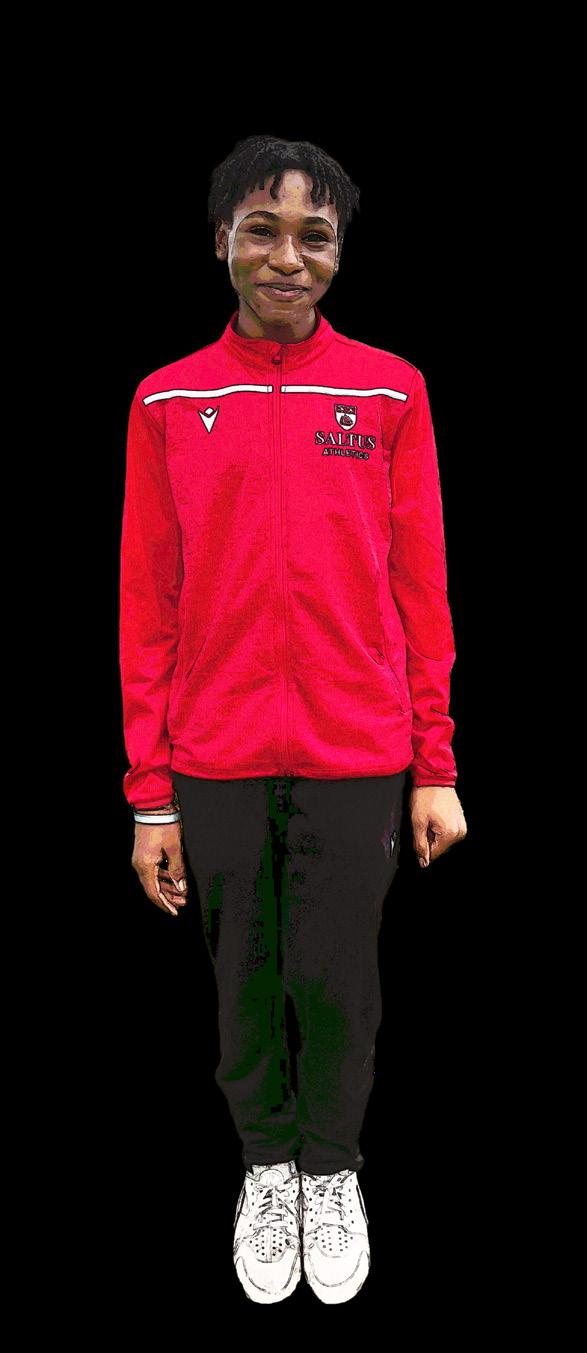
• Clothing may not be worn that promotes the use of tobacco, illegal drugs or alcohol; advocates illegal activity; denigrates or promotes hatred of a person or persons
• Clothing may not be worn that contains profanity, pornography or obscene images
• Mid-thigh length shorts and/or skirts may be worn. They should be worn no higher than mid-thigh.

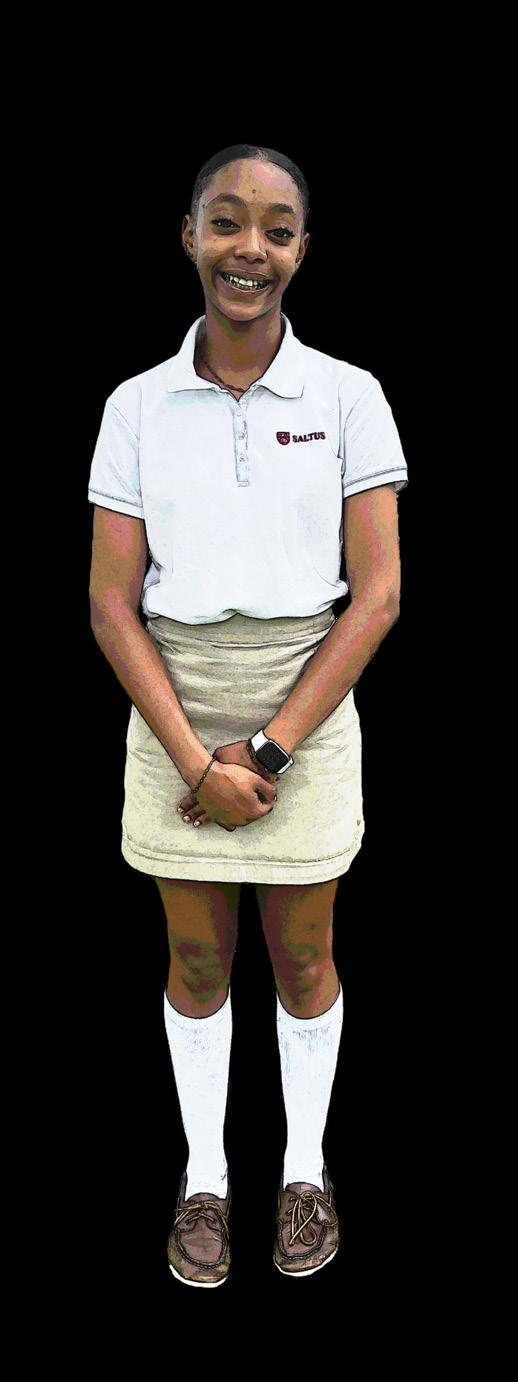
• Pants, skirts & shorts to be worn around, not below the waist
• Tops are required to cover the chest, back and midriff
• Strapless, backless or cropped tops cannot be worn
• At no time should undergarments be showing
• Clothing must conform to health or safety requirements, including requirements arising from participation in specialised programmes and events. (i.e., DT, Science & PE)
• If students fail to abide by the following guidelines, they will be asked to return home to change.
32
Secondary - Grub Days
Saltus supports many charities and events which usually result in one to two ‘Grub Days’ a term where students may dress in their casual clothes. On days when the uniform is not required (i.e., Grub Days), students may not wear clothing that undermines the School’s commitment to maintaining a safe and inclusive learning environment. Should a student fail to meet this expectation, they will be addressed about the specific dress code concern in a discreet and respectful manner. They may be asked to adjust their attire (e.g., covering up) or return home and change. Grub day clothing cannot promote the use of tobacco, illegal drugs or alcohol; advocate
illegal activity; denigrate or promote hatred of a person or persons. Clothing may not be worn that contains profanity, pornography or obscene images. Mid-thigh length shorts and/or skirts may be worn. They should be worn no higher than mid-thigh. Pants, skirts and shorts are to be worn around, not below the waist. Tops are required to cover the chest, back and midriff. No strapless, backless, or cropped tops are to be worn. At no time should undergarments be showing. Clothing must conform to health or safety requirements, including requirements arising from participation in specialised programmes and events. (i.e., DT, Science & PE)
Class Attendance & Absences
Attendance Policy
Consistent school attendance contributes greatly to student engagement and student learning success. Students are expected to be present and prepared for each class period. Attendance is taken during each class.
Students are expected to arrive at all required commitments on time, prepared and ready to participate as needed. Required appointments include class meetings, athletics, and similar extra-curricular obligations, and all school events. If a student is unable to attend school due to illness, the parent or guardian should contact the school at attendance@saltus.bm.
Student attendance information is available to parents and guardians through the Parent portal and to students through the Student portal on SaltusLive.
Students wishing to leave school campus should have written (email to their advisor and or attendance@saltus.bm) permission from parents if they are leaving for an appointment.
SGY1 and SGY2 students may leave campus with permission from their parents/guardians.
Signing Out Procedures – Illness, Accidents or Appointments
If students feel unwell or have an accident, they must tell their advisor or a teacher. The Secondary Administrative Assistant will then be contacted. Students cannot call home from their cell phone and then leave. They must let a school adult know (administrative assistant, advisor, teacher etc). If the injury is deemed to be more serious then they will call for a First Aid Attendant. If they are too ill to remain at school, or if hospital treatment is necessary, then the First Aid Coordinator will contact parents/guardians to make suitable arrangements and give permission to have the student sign out. Under no circumstances should students leave school or go home without permission and without signing out.
If a student has an appointment during school hours or must leave school during the day for any reason, then parents must contact
33
their advisor as well as our attendance officer (attendance@saltus.bm). Students are required to sign out before leaving school property and, if they return on the same day, must also sign back in before returning to class.
Planned Absences
If a student needs to leave campus for multiple days for a non-school sponsored activity, their parent/guardian must request permission from the Assistant Director directly. Permission is typically granted for events such as religious observations, memorial services, family weddings, participation in sporting events, or medical appointments.
Parents are required to let the School know in advance of any planned absences. Please avoid making appointments, travel arrangements and extended holiday plans during school time.
Permission is typically granted for events such as religious observations, memorial services, family weddings, participation in sporting events, or medical appointments.
In the case of a sudden absence request, the Assistant Director will make every effort to respond quickly.
We urge families to consider special requests very carefully as a student’s absence may jeopardize their learning as well as that of their peers due to shared presentations, assignments, co-curricular commitments, and leadership responsibilities. We appreciate your support in ensuring that your child is at school and progressing well.
Excused absences are identified as student illness (a medical note is required for longer than three days), bereavement, religious holidays, family emergencies, exceptional circumstances and representing their nation in a sporting competition.
If a student needs to leave campus for multiple days for a non-School sponsored
activity, their parent/guardian must consult with the Assistant Director directly. The Assistant Director will communicate with the family regarding the absence and work may be provided dependent on the individual circumstance. Teachers will not provide work for absence due to family vacation outside of school holidays.
Class Attendance
Faculty prepare for classes and look to engage students in the classroom and partner with students to achieve high standards of scholarship. Consistent school attendance contributes greatly to student engagement and student learning success. Students are expected to be present and prepared for each class period. Attendance is taken at the beginning of each class.
Absence Due to Illness
Please do not send students to school unwell. Any student who is unwell at school may be isolated and sent home.
Thank you for your understanding. Our priority is always the health and safety of the Saltus Community.
Unexcused Absences Student Responsibility
If a student is notified of an unexcused absence, the student is responsible for ensuring that a parent or guardian emails attendance@saltus.bm to excuse the absence. Notifications of absences will be sent via Official Note.
Consequences for Unexcused Absences: Consequences of unexcused absences will follow a progressive discipline approach.
First unexcused absence:
• A student’s first unexcused absence in a term will result in a conversation with their advisor.
• Parents will be notified of unexcused absences via ‘Official Note’.
34
Second and third unexcused absence:
• All subsequent unexcused absences will require a conversation with the Assistant Director.
• A reflection period will be served for every two unexcused absences.
Fourth unexcused absence:
• A meeting will be scheduled for the student, parents, advisor, and Assistant Director to discuss attendance issues and its impact on student learning and engagement.
• Solutions will be discussed and identified to get the student caught up if/as needed.
Fifth unexcused absences:
• At the fifth unexcused absence the student will be placed on an attendance contract.
• The contract lasts for one term beyond the one in which it was imposed.
• Student attendance will be monitored closely.
Additional Unexcused Absences
• If a student earns more than two additional unexcused absences while on the attendance contract, the Assistant Director will coordinate an attendance review conference with the student, including their advisor, the Year Coordinator, and others such as the School Counsellor or Learning Support Specialist as appropriate, and will send notification of results to parents.
• Parents and the student meeting will occur for signature and agreement to the conditions set out in the attendance contract.
• An accumulation of eight or more unexcused absences per term may be indicative of problems that the School may not be able to address effectively. At this point, serious discussions among School officials and the student and their family may ensue regarding whether Saltus is the appropriate school for the student.
*Please note:
• Extended (more than three days) absences due to illness will be sanctioned once a doctor’s note or other appropriate medical documentation is provided. These absences will not count towards the total number of absences, but excessive absences of this nature may lead to a required medical leave.
• Absences due to a school-sponsored event will be sanctioned and will not count towards the total number of absences.
Lateness
Students are expected to be on campus on time and ready for class for 8:30 am. If you know that your child(ren) will be late, please email attendance@saltus.bm so that they can be excused.
Continued, or a pattern of habitual tardiness, will lead to a parent meeting and progressive discipline measures will be applied.
Any student who is tardy to a class or advisory more than 10 times in a term will be placed on Attendance Warning.
If a student earns more than two additional tardies while on ‘Attendance Warning’, the Assistant Director will coordinate an attendance review conference with the student, including their Advisor, Year Coordinator, and School Counsellor or Learning Support Specialist as appropriate, and will send a notification of results to parents. Parents and the student will be required to meet with the Director or Assistant Director and agree to a written attendance improvement contract. Attendance will be taken at the beginning of each lesson. Students who are late to class three times within a week will be required to stay after school on Friday to discuss their actions with the Assistant Director.
35
School Policies and Rules
Academic Integrity
The principle of academic integrity is the cornerstone of a school environment. Unless assignments are specified as collaborative endeavours, assignments are to be completed by the individual students. Academic dishonesty is unacceptable at Saltus.
Expectations regarding academic integrity shall be communicated to students by staff at the beginning of the school year (including how to acknowledge others’ work or ideas) and reinforced regularly with our students.
The following are examples of academic dishonesty:
1. Plagiarism – the unacknowledged use of another’s words or ideas:
a. When using another’s words, quotation marks must be used, and the author needs to be cited.
b. When using the product of someone else’s research, a citation that gives credit is needed.
c. Even when paraphrasing or changing words from a source, one must give credit for the ideas obtained from any other source.
d. The principle of plagiarism is not limited to academic work. When making speeches, writing an application essay, or competing on an academic team one must always attribute words and ideas to their source.
2. Using unauthorised notes or other aids while taking an assessment or copying from or being influenced by another student’s work during an assessment.
3. Giving unauthorised aid to another student; allowing another student to copy or use one’s test, paper, or homework.
4. Using external resources on homework or take-home tests that are beyond the limits specified by the teacher.
5. Using translating software, including those found on the internet, without permission of the teacher.
Consequences for Violation of Academic Integrity
Upon identifying a situation where a student is in violation of expectations for academic integrity, as a first step school staff will gather information to assess the student’s understanding of the violation and the circumstances surrounding the violation.
The following section outlines the likely consequences of academic dishonesty. Consequences may be adjusted if a particular situation presents unique, mitigating or aggravating circumstances.
First Offense:
Saltus takes a first offense seriously and uses it as an opportunity for education and growth. A first academic integrity violation will ordinarily include the following:
• The student receives a ‘Letter of Warning’ from the Assistant Director
• A grade penalty or equivalent will be determined by the referring teacher in consultation with the Assistant Director and the Head of Department
• The student may be asked to redo and successfully complete the assignment or to complete an alternative academic assignment
• An educational and/or counselling intervention may occur as determined by the Assistant Director in conjunction with the School Counsellor and/or Learning Support Specialist
Second Offense:
An offense that is egregious (e.g., multiple instances of cheating, distributing materials to help others cheat, etc.) or a second offense
36
will lead to a consequence that will ordinarily include the following:
• The student will be placed on Academic Probation
• A grade penalty or equivalent will be determined by the referring teacher in consultation with the Assistant Director and the Head of Department
• The student may be asked to redo and successfully complete the assignment or to complete an alternative academic assignment
• An educational and/or counselling intervention will occur as determined by the Assistant Director in conjunction with the School Counsellor and/or Learning Support Specialist
• Meeting with parents and the Assistant Director
Third Offense:
A third offense will lead to a meeting with the parents/guardians and the Academic Director and a conversation regarding the suitability of the student for the School community. If a student is allowed to remain in school additional consequences will be implemented.
Off-Campus Conduct
School rules, regulations, and guidelines apply to all students at any time when they are on school property or at school-sponsored activities. We urge all members of our community to honour the Code of Conduct in their private lives as well. We view conduct outside of school and school-sponsored activities as the responsibility of the parents and students. It is not policy to monitor or regulate private conduct that does not involve the school unless the conduct is brought to our attention that constitutes unsafe behaviour of a student, or otherwise serves to disrupt the harmony of the School community. This includes and applies to students’ use of computers, the internet, and social media off campus.
Harressment
Harassment against any individual whether or not based on a protected ground (whether actual or perceived) such as sex, sexual orientation, gender identity or expression, race, colour, religion, national origin, ethnicity, family status, political opinion, or disability will not be tolerated. Harassment in this context is defined as any unwelcome conduct that has the purpose or effect of violating a person’s dignity and creating a hostile environment such that the conduct interferes with, limits, or denies an individual’s educational access or opportunities. A single incident can amount to harassment. Harassment can also include treating someone less favourably because they have submitted or refused to submit to such behaviour in the past. Harassment may be related based on actual or perceived membership in a protected class. Harassment and/or discriminatory behaviour can result from conduct that is verbal (e.g., innuendos, threats, ethnic slurs, derogatory jokes, pejorative epithets, propositions or gestures), non-verbal (e.g., obscene gestures), written (including online communications), visual (e.g., graphic posters and drawings) or physical (e.g., unwanted touching, assault) that is severe or pervasive and objectively offensive.
Identity-Based Slurs
The School will not tolerate the use of identitybased slurs nor identity-based terms used as a pejorative by anyone in our school community whether on school property, on school-related trips off school property, at any schoolsponsored activities or at social functions. The use of identity-based slurs (including but not limited to insults historically and currently related to ability, ethnicity, religion, gender identity and expression, race, sexual orientation or any other protected ground) or identity-based terms used as a pejorative are offensive and harmful to specific individuals and erode the welfare of the Saltus community
In these instances, the detrimental impact
37
of the identity-based slur on the community member(s) will take precedence over the intent of the alleged harasser(s).
Reports of incidents involving identity-based slurs or terms used as a pejorative may be made to any student, faculty member, or School Administrator, who must inform the appropriate Assistant Director. Any community member with knowledge that a student has been the target of an identity-based slur or term used as a pejorative is encouraged to immediately report the act to that student’s Director or Assistant Director. Reports (including online harassment) will be investigated by the Assistant Director and may consist of interviews with the reporting and responding students, as well as any witnesses to the incident(s), and include the evaluation of any information that may be relevant to the case. The School will endeavour to safeguard the identity of persons reporting incidents and will address any and all retaliatory behaviour targeting persons who have reported the behaviour.
In addition to appropriate disciplinary responses, the Assistant Director may require the responding student to participate in educational training, engage in a restorative process or, meet with the School Counsellor, and/or any other appropriate measures aimed at repairing fractures created by the responding student’s words and/or actions.
Sexual Harassment
The School will not tolerate sexual harassment of students by anyone, whether on school property, on school-related trips, off school property, at school-sponsored social functions, online or elsewhere. In a school setting, sexual harassment is conduct that 1) is sexual in nature; 2) is unwelcome; and 3) has the purpose or effect of creating an intimidating, hostile or offensive environment.
Examples of Sexual Harassment:
Verbal:
• Sexual innuendoes
• Suggestive comments
• Jokes of a sexual nature
• Sexual propositions
• Threats or extortion
Non-verbal:
• Sexually suggestive objects
• Pictures, or messages sent via email, text, or social media
• Graphic commentaries
• Suggestive or insulting sounds such as whistling
• Obscene gestures
• Unwanted physical contact
Bullying and Cyber-Bullying
Bullying is classified as unwanted behaviour that involves a real or perceived power imbalance. The behaviour may be repeated, offensive, intimidating, malicious or insulting behaviour which can make a person feel vulnerable, upset, humiliated, undermined or threatened. Below are various forms of bullying that can occur in person or online.
Examples of bullying may include:
Verbal Bullying (in person or online):
• Teasing
• Name calling
• Inappropriate sexual comments
• Taunting
• Threatening to cause harm
Social Bullying (in person or online):
• Cancel, ostracise and/or intentionally shun someone
• Spreading rumours about someone
• Embarrassing someone in public for the purpose of humiliating them
• Sharing images/videos/comments online for the purpose of intimidation and/or embarrassment
38
Physical Bullying:
• Hitting/kicking/pinching
• Spitting on someone
• Tripping/pushing
• Taking or breaking someone’s possessions
• Making mean or rude hand gestures
Reporting Bullying
The School recognises the importance of maintaining open lines of communication to prevent and address bullying. Students and parents are encouraged to report bullying as soon as possible, and to utilise support systems offered by Saltus. Students who are victims of bullying and/or have witnessed bullying behaviour are encouraged to seek out the immediate assistance of a trusted adult. This can include a parent, an advisor, a year coordinator, a teacher, the Director and Assistant Director. Staff are committed to preventing, recognising, investigating, and addressing bullying issues in as timely a manner as possible. Progressive and ageappropriate discipline will be used to address bullying behaviours.
The person reporting the bullying has the option to request anonymity.
Violence
Students are expected to resolve issues in a productive non-violent manner. If a student experiences any type of unwanted behaviour, they are encouraged to seek the assistance of trusted adults to address differences and seek an acceptable resolution with peers. The use of physical force (such as shoving, pushing, slapping, punching, kicking, fighting) is unacceptable behaviour that may result in consequences including but not limited to:
• In school student reflection period,
• Removal of privileges,
• Participation in restorative meetings,
• In-school suspension,
• Out-of-school suspension,
• Expulsion/dismissal.
Drug and Alcohol Use
The use or possession of illegal drugs and alcohol as well as the misuse of prescription drugs and other chemical substances are detrimental to the well-being of the individual and the community and are incompatible with the purposes and objectives of the School. Rules regarding the purchase, possession, distribution, or use of these substances are essential to maintaining a healthy academic and social environment. The School expects students to take immediate action to get help from adults when they have knowledge of another student who is impaired and in danger from the use of drugs or alcohol.
Saltus aspires to be a drug-free community. Any purchase, possession, distribution, or use of illegal drugs, prescription drugs (such as ADD medication or narcotics) not fully in accordance with a physician’s prescription, or the abuse of any other chemical substances (including over-the-counter medications, cigarettes, and e-cigarettes) will lead to immediate suspension. Any misuse or abuse (including excessive use or distribution) of one’s own prescription or another student’s prescription is also a suspension-level offense.
A student in possession of paraphernalia that can be used to consume illegal and/ or controlled drugs should expect to be drug tested (unless the paraphernalia has evidence of drug use) in which case the student faces immediate suspension. A student should also expect to be tested if there is reason to believe that they violated this policy. For fairness and thoroughness, any student present during the suspected use of drugs, whether directly involved or not, should expect to be tested. Drug testing will be conducted by a 3rd party company such as Benedict Associates.
Refusal by the parent/student to permit or refusal by the student to submit to drug testing will result in an escalation of disciplinary responses.
39
Purchase, attempt to purchase, possession, distribution, or use of drugs or alcohol in any form by students is grounds for suspension. Alcohol is prohibited on school grounds and at any school-sponsored events unless provided by the School to adults over the drinking age.
In the event of possession of an unlawful item, such as a weapon, cigarette, vape pen, alcohol, or illegal substances, the item will either be disposed of or handed in to the police.
Unsafe Practices and Possessions
Unsafe practices and possession of items that might compromise the safety of others are not allowed and may be grounds for probation, suspension, and/or expulsion. The School values the health and wellbeing of everyone, we do not allow students to place themselves or others at risk by their actions or their possessions. The following are examples of guidelines concerning personal and community safety:
Fires: A student may not light a flame or create a fire on the campus without specific permission from a faculty member. Lighting a flame or intentionally setting fire in any building or tampering with smoke detectors or other fire safety equipment may result in consequences including probation, suspension, and/or expulsion.
Weapons: Use or possession of ammunition or any offensive weapon presents a danger and such items are prohibited. Any violation of this policy would be a major violation of the School’s Code of Conduct and will likely lead to expulsion.
Reckless endangerment: Students may not engage in dangerous pranks or other activities that pose threats to the personal safety of themselves or others. This includes bringing to school replicas of weapons.
Disciplinary Responses to Major Violations of the Code of Conduct
If it has been determined that a Major School Rule violation has occurred, the Assistant Director, in consultation with the Director and the Head of School, will determine the appropriate consequence.
In all cases, prompt communication with the student’s parent/guardian will be established to discuss the major violation incident. A meeting with parents and the student will be established to discuss the incident, the impact of the incident, and the consequence of the behaviour. Written documentation will be sent to the student’s parent(s) or guardian(s) notifying
them of the offense and any action taken in response. Based on the severity of the violation the following disciplinary sanctions may be implemented:
1. No Action/Internal Action: For minor offenses, a student may be assigned internal consequences such as a meeting with the Assistant Director, community service, a lunchtime reflection period, restrictions of privileges, etc. The Assistant Director will send a follow-up Official Note documenting the offense and the action taken.
40
2. Official Letter of Warning:
A letter of warning will be written by the Assistant Director outlining the facts of the case and indicating the censure of behaviour in question and a directive to avoid any other violations. The letter will be kept in the student file. If later, another school violation is noted, the letter and incident will be considered while determining the appropriate response. A letter of warning may be used in concert with Community Restoration.
3. Community Restoration:
Community Restoration can last for two to six weeks depending on the severity of the violation and the discretion of the Assistant Director. During this time the student is expected to reflect and fully commit to meeting the standards of the School.
The student’s behaviour and progress will be assessed by the Assistant Director at the midpoint of the restoration period. As part of this review, the Assistant Director will collect statements from the student’s current teachers and Advisor.
The Assistant Director and/or Director will meet with the student to review progress in meeting the expectations of Community Restoration. The information collected for the midpoint review will be part of the overall assessment of the student at the final review. Prior to the final review, the Advisor and Assistant Director will gather information from teachers relating to the student’s progress. In addition, the students may wish to submit a report from a chosen faculty member. During the final review, the student will be expected to: reflect upon the behaviour that had resulted in being placed on Community Restoration, demonstrate their progress with reflection, learning and rebuilding trust, and present reasons for the Assistant Director to permit the student to be relieved of disciplinary action.
After consideration of the reports and conversations with the student and Advisor, the Assistant Director will decide either: that the student passes the review or that the review should be extended for one additional three- to five-week review period.
4. Probation:
Probation is the School’s strongest disciplinary response short of suspension or expulsion. Any additional violation of a major school rule while on general probation is likely to result in that student’s suspension or expulsion. When a student is placed on probation, it will usually be for the length of a school term and a behaviour contract will be in place. During this time the Assistant Director will work with the student, parents, and School Counsellor (where appropriate) to come up with a plan of support. This will take the form of a contract with clear expectations and goals for the student to achieve during their time on probation. At the end of the probationary period, the Assistant Director will work with the Director to determine whether the probation period will be removed or needs to remain in place.
5. Suspension:
In rare instances, a student may be removed from classes or from campus for either an in-school suspension or an out-ofschool suspension. A suspension may be recommended when the behaviour was deemed to be egregious or violent, other previous interventions have failed, or the student has violated warning or probation status.
6. Dismissal/Expulsion:
In rare instances, the Director and Assistant Director may recommend to the Head of School that a student be expelled. In such circumstances, the Head of School will review:
a. the facts related to the incident
b. the student’s conduct and conduct history
41
c. the school support and interventions offered to the student d. the steps taken for the fair procedural process
The Head of School will meet with the student and parents/guardians providing them with an opportunity to:
• hear the facts regarding the major Code of Conduct violation,
Appeal Process Appeals
• advocate for their child to voice any concerns.
Following a parent meeting, the Head of School will take the necessary time to gather any additional information needed to make a decision regarding the consequences issued. The Head of School will inform parents of the decision in written form. Consequences for major violations of the Code of Conduct may include out-of-school suspension or expulsion.
In response to suspension or expulsion should a student or parents wish to launch an appeal, the appeal should be made in writing to the Head of School within five (5) days of the suspension. Please note that suspensions will be entered into a student’s record. In some cases, the record of suspension may be removed depending upon review and discussion with the Director of the relevant division and/or the Head of School or their designate.
Responsible Use of Technology
Technology is used regularly in all classrooms at Saltus Grammar School. While the Primary classrooms have Aquosboards, Chromebooks, and iPads, Secondary students have personal devices. The following points address awareness for every student in the school from Foundation Year through to the Saltus Graduate Years.
Proper and Ethical Use
Using technology resources responsibly and with respect for others are the key tenets of the Saltus Grammar School Responsible Use Policy. Students should use Saltus technology and their personal technology, following the same guidelines used with other school resources. These guidelines include protecting your personal safety and that of others, respecting school and classroom rules, honouring the rights of others, and abiding by all rules regarding the use of technology.
Students in Years 7 through Year 11 participate in our One-To-One Device Programme and
are required to purchase a tablet or laptop through the school. Students in SGY1/SGY2 have the option to join the One-To-One Device Programme, lease a laptop from the school or sign up for the BYOD (Bring Your Own Device) option. Each student is responsible for ensuring that this essential learning tool is always available and in good working order. The tablet or laptop’s purpose is for educational rather than recreational use.
A Saltus student is expected to exemplify the principles of the Code of Conduct at all times, including when using technology. Students are expected to abide by the Technology Use
42
Guidelines, which govern the use of technology, and to commit to the Responsible Use Agreement on SaltusLive
The following agreement will be shared with all students and families at the start of each school year from Year 1-SGY2. Parents will be required to confirm their acknowledgement of this agreement via digital form. Student will be required to review and acknowledge digitally from Middle School through to SGY2.
As a digital citizen, I will use devices (computers, tablets, phones, etc.), the internet, and information technology tools responsibly to gather knowledge, learn collaboratively, and share my understanding online. I promise to be a good digital citizen by following these expectations:
• I will read, discuss, and sign this agreement together with my parents.
• I will use technology for school work, and with the permission of a supervising adult.
• I understand that the school may monitor the technology I use and what I do online, but that ultimately, I am the one responsible for my behaviour with technology.
• I will follow rules set by my teachers and/ or the Information Technology Department (Helpdesk), and will not allow technology to distract from my learning or the learning of my peers; for example, by playing games, listening to loud music, or using social networks that are not related to my school work.
• I will ask an adult when I am unsure about how or when I may use technology.
• I will return all school-owned technology to its proper storage place after use each day and inform the teacher or Information Technology Staff (Helpdesk) upon return.
• If I bring a mobile/smartphone to school, it will be turned off and kept in my locker during school hours. If I need to use my mobile/smartphone during school hours, I will ask the permission of my teacher.
• I will not use technology to be mean, rude, or unkind to other people, and will be respectful and thoughtful when sharing my own work, commenting on the work of others, and communicating with others online.
• I will respect copyright laws, and will not use technology to access inappropriate, offensive, or illegal material.
• I will keep my passwords private and will respect the privacy of others’ passwords.
• If I see or read anything on a computer/ device that makes me feel uncomfortable or that I know is not acceptable at school, I will close the device, not respond to comments or show others, and tell an adult in the Saltus community right away.
• I will not share personal identifying information (such as full name, address, email addresses, or phone numbers) online, and I will not take or share photos or videos of others without their permission.
• I will not attempt to harm, damage, or bypass the school’s technology systems.
• I will look after my device and any school device by keeping it in a case and keeping food and liquid away from it; always closing the lid before carrying it and being careful not to drop it; and telling an adult right away if there is any damage.
• I will not use another student’s device.
• If I am allowed to bring my own device, I will bring it fully charged and/or with a charger.
• I am responsible for taking care of my device and for any damage that occurs at school.
• I am responsible for taking care of any borrowed school device and for any damage that occurs to the device at school or not (provided the device is allowed off school property)
• I understand that I have a limited print credit and will use printers for schoolrelated work and items only. I understand going over my limit will require approval from my advisor to have any credit added.
• I understand if the Information Technology
43
Department contact me regarding issues and updates that I need to apply any requests or report to Helpdesk as soon as I can.
• I understand that should I maliciously or accidentally damage someone else’s technology equipment or laptop, I may be responsible for paying for repairs.
• I understand that my behaviour using technology at school and out of school may have consequences as outlined in the Student Code of Conduct.
Additional Policies
It must also be noted that, in addition to the guidelines above, individual departments may create and implement additional (age appropriate) policies for technology use. These may include time of day restrictions (i.e., no tech recess or lunch), location restrictions (e.g., no devices in bathrooms), and device restrictions (e.g., no cell phones throughout the teaching day). Student laptops on the One-toOne Devices Programme will be installed with our security software, ‘Securus’. Securus is an e-Safety Platform that is only triggered if a breach of the policy is detected. Once a breach is detected an automatic screenshot will be taken and saved. As a school, this allows us to protect our students from harm and offer reassurance that our school networks are safe and secure. It also encourages our students to assess risk and take responsibility for their actions. The information Securus collects
is stored electronically until viewed by the relevant Director or Assistant Director who will take appropriate action that is proportionate to the content of the incident in question.
Captures will be monitored over the course of the academic year (September-June).
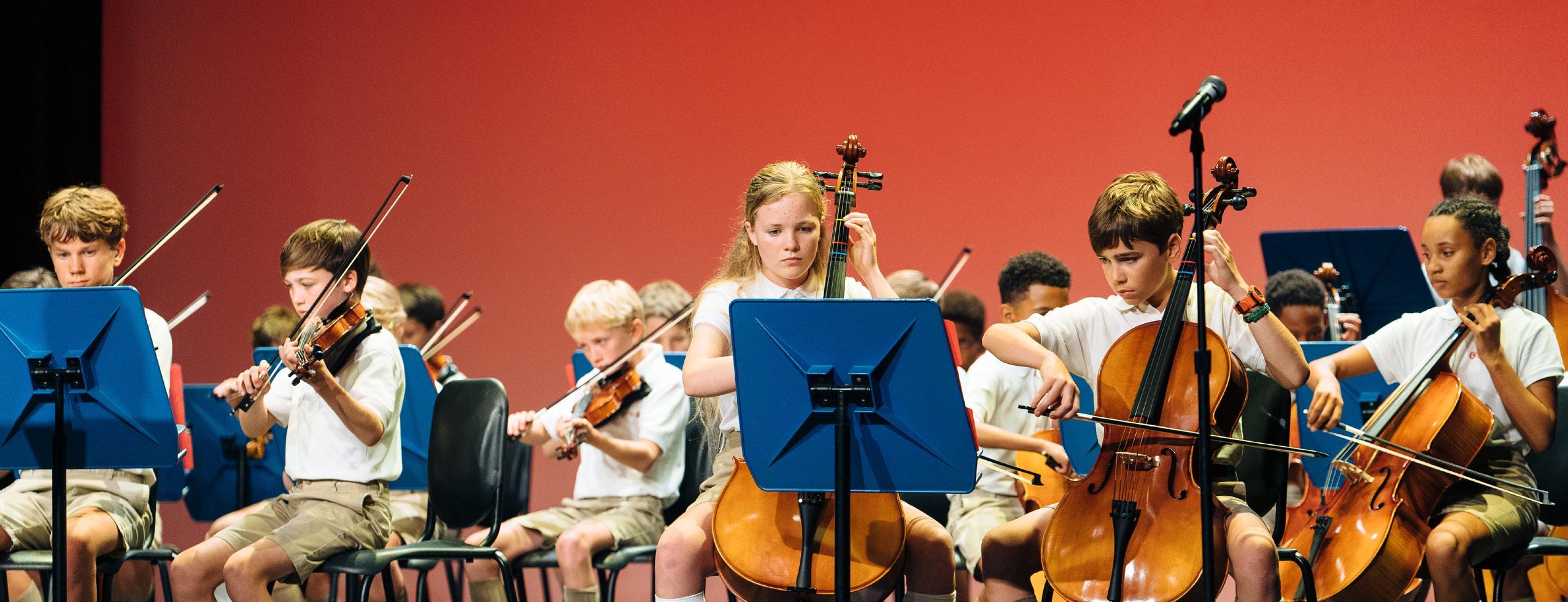
Cell Phones and other mobile devices
Students are permitted to have cellular phones and personal entertainment devices on campus, but they must be powered off and stowed during the school day (8:20 am to 3:30 pm).
Kindles or other eBook readers, including iPads with eBook apps, are permitted; however, the School is not responsible for damage or loss. These devices must be operated in stand-alone mode and cannot be connected to the School’s Wi-Fi network. All parent communication to the School during the academic day must come through the School Reception.
A privilege of the SGY Programme is that students are allowed to use their devices in the SGY Common Room. Students are provided with access to the ‘SGY’ wireless network and are required to adhere to the School’s ‘Technology Use Agreement’ at all times. Devices are not permitted to be used outside of the designated areas. If students are found in contravention of this then their device will be confiscated, placed in an envelope, and handed to the School Receptionist. A letter to parents will be issued and they will be expected to come and collect the device.
Academic Programme
Curriculum and Assessment
At Saltus, we strive to hear the voices of our students as we explore their interests while ensuring that essential academic standards and skills are being met throughout our students’ learning journey.
Through authentic inquiry-based experiences, investigative research, and explicit teaching, students are able to engage in rich learning opportunities that deepen understanding of phenomena, concepts and ideas of the world around them. Students are encouraged to explore content through an interdisciplinary approach and a variety of mediums, in the classroom, and beyond our walls at Saltus with the support of community partnerships, as they develop an understanding of multiple perspectives, concepts and ideas.
Our competency-based approach to learning allows students to develop skills that will allow for transfer of knowledge to novel, complex problems rather than simply a recall of content. Our students are propelled to become articulate, collaborative, critical thinkers and problem solvers. We believe that through meaningful, contextualized experiences they will develop skills that will enable them to succeed throughout their time at Saltus and beyond.
Curriculum, assessment and teaching are all connected. By looking closely at a student’s performance on assessments—not just their grades—teachers can identify any informed changes that need to be made to their instructional approaches. At the same time, our
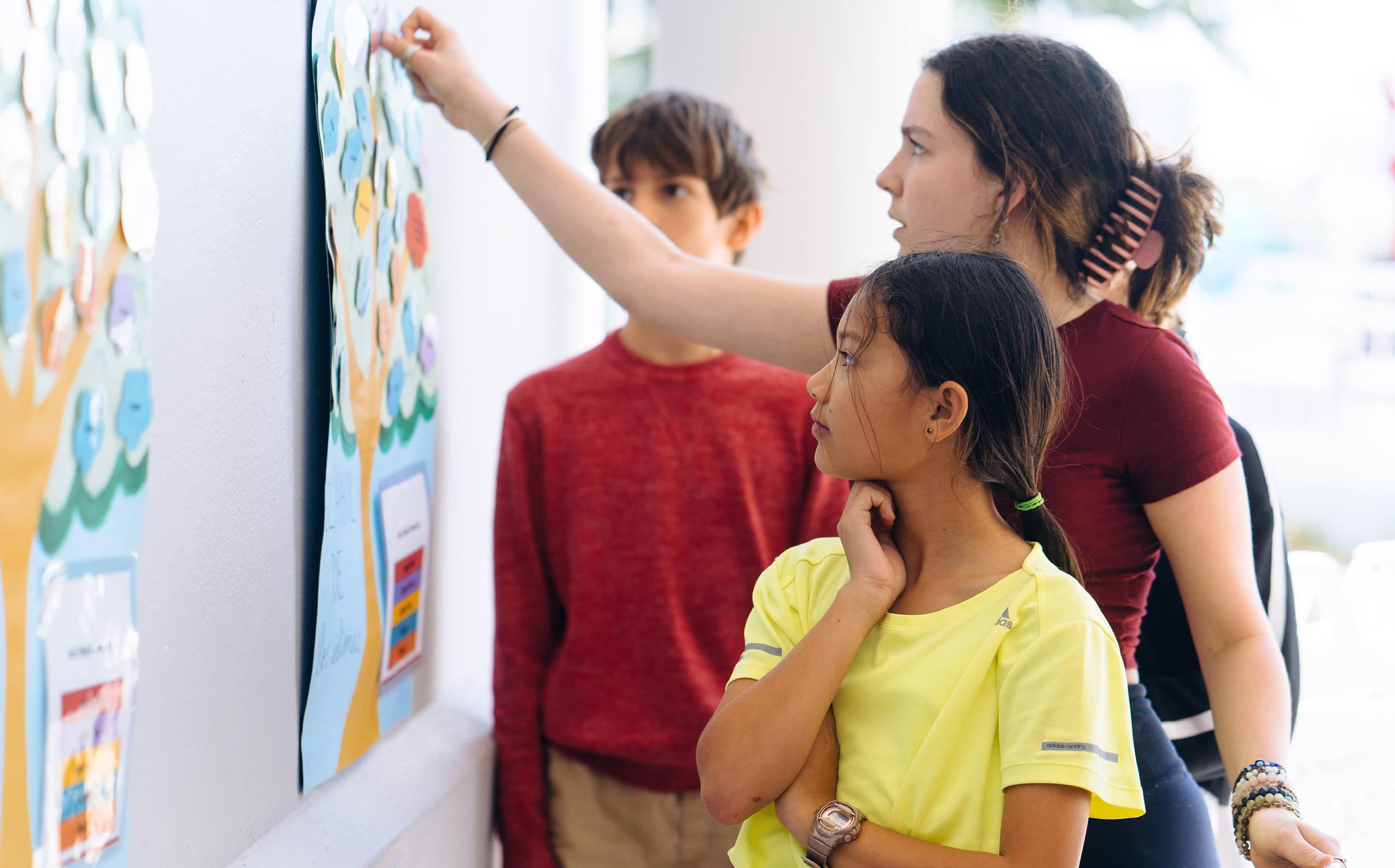
45
purpose is to prepare students for the world they will inherit. Our curriculum, assessment and teaching practices are authentic, centered around real-world relevance to enable students to develop the curricular competencies and thinking strategies to take with them into the wider world.
How we assess reflects our belief about the abilities and potential of all students and is rooted in a shared understanding of the goals and criteria required for every assessment. Throughout a term, a school year and a student’s journey through their years at Saltus, assessments provide a set of snapshots that when put together, portray a student’s progress towards their learning goals. A full picture of a student’s learning based on multiple assessments, observations, oneon-one conferences, daily work, reflections, performance tasks, and traditional tests and quizzes.
Year 10 and 11 students will continue to follow the UK National Curriculum and complete the (I)GCSE examinations. The (I)GCSE, is offered internationally and covers a range of subjects, including core areas like Mathematics, English Language, and Sciences, as well as optional subjects. The qualification is awarded based on a combination of coursework and final examinations.
Our Saltus Graduate Years (SGY) programme offers Advanced Placement (AP) Exams offered by the College Board in the United States and Canada. AP courses provide our students with the opportunity to earn college credit and demonstrate their proficiency in specific subjects before entering higher education. AP
Exams are designed to be challenging and rigorous, resembling college-level coursework.
AP Exams cover a wide range of subjects, including Mathematics, Sciences, Social Sciences, Languages, Arts, and more. While AP Exams are primarily associated with the United States and Canada, they are recognized by universities around the world. AP Exams are offered annually in May. The testing schedule includes specific dates for each subject.
SGY 1 students also sit The Preliminary SAT (PSAT) which is a standardized test administered by the College Board in the United States. It serves as a practice test for the Scholastic Assessment Test (SAT).The PSAT provides valuable feedback on their readiness for the SAT as well as potential areas for improvement.
Parents will be provided with opportunities to review progress/assessments and to meet with teachers. A thorough report will be provided three times during the year for Year 10 and SGY1 students. Due to study leave and examinations, Year 11 and SGY2 students will only receive two reports – one at the end of the winter term and one at the end of the spring term.
For Term 3, Year 11(i) GCSE exams will start in early May and run until late June.
Term 3 for SGY2 will run from Tuesday, 9th April – Thursday 25th April. Following a week for study leave, AP exams and internal exams will run during the weeks of Monday, 6th & 13th May.
46
Exams
The academic programme at Saltus includes both internal and external examinations. The examination schedule is as follows:
Year 10: Students will have end-of-year examinations at the end of May. These examinations will be entered into the gradebook as a summative assessment for marking period 3 (MP3).
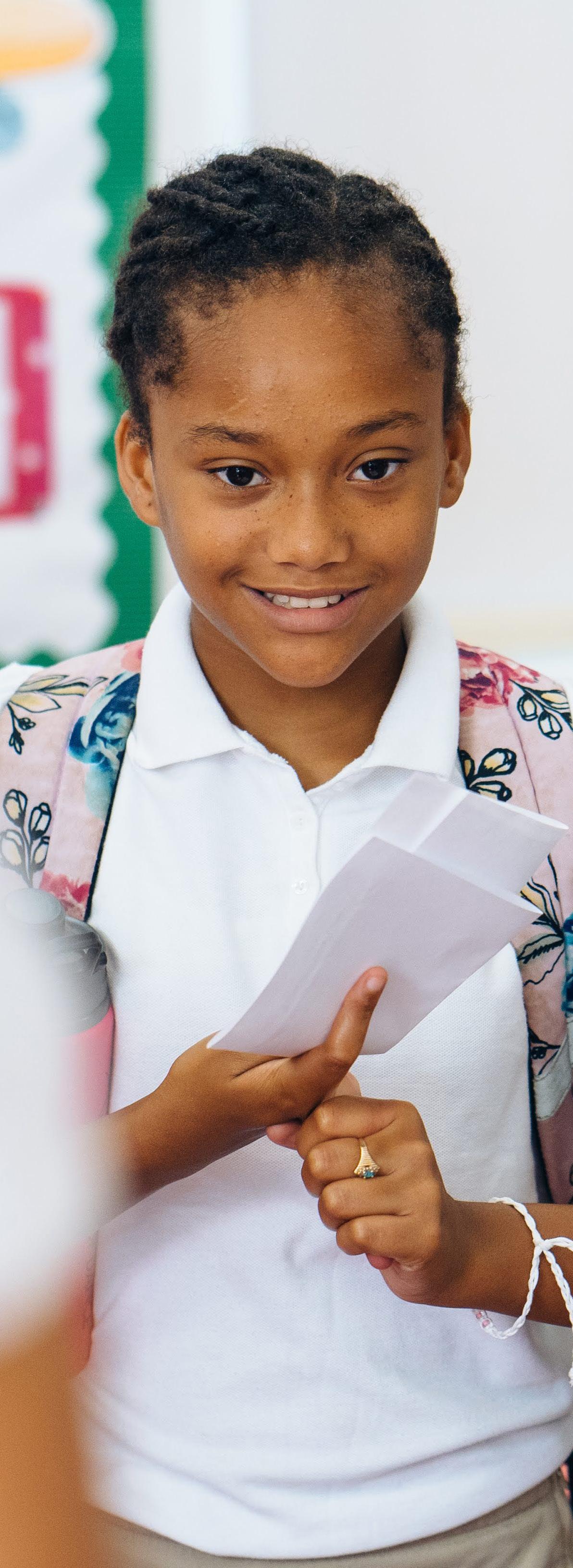
Year 11: Students will have mock exams in December. These are diagnostic tools and will ensure teachers are best placed to address any areas of concern in advance of their external examinations in May/June. These dates are in line with those set by each examination board.
SGY1: Students taking AP papers in May will have mock examinations in January. These are then supplemented by end of year exams in May. The May examination cycle will coincide with the external Advanced Placement (AP) exam schedule. For those students taking courses that are not externally examined, they will be expected to gain a passing grade of 55%. If they fail to do so, then they will be expected to re-take. Re-takes will be ‘capped’ at 55%. These grades will then be entered into class gradebooks as an assessment grade. The passing of certain SGY1 courses is a prerequisite for entry into SGY2. For full details, you are encouraged to refer to the ‘SGY Course Pathways’ document.
SGY2: Students will have mock exams in January. These are then supplemented by end-of-year examinations in May. The May examination cycle will coincide with the external Advanced Placement (AP) exam schedule. For those students taking internal courses, they are expected to achieve a
passing grade of 55%. If they fail to do so, then they will be expected to re-take. The passing of all courses is a prerequisite for graduation in
Honour Roll
June. However, when making a final decision we will take into account a student’s academic performance over the course of the year.
In the Senior School, the Head of School’s Honour Roll is awarded to students who achieve an overall average of 85% or above for all their subjects. Honour Roll is awarded to those students who have achieved an overall average of 80-84% or who have gained a Saltus Attitude to Learning (SAL) grade of 1.6 or less.
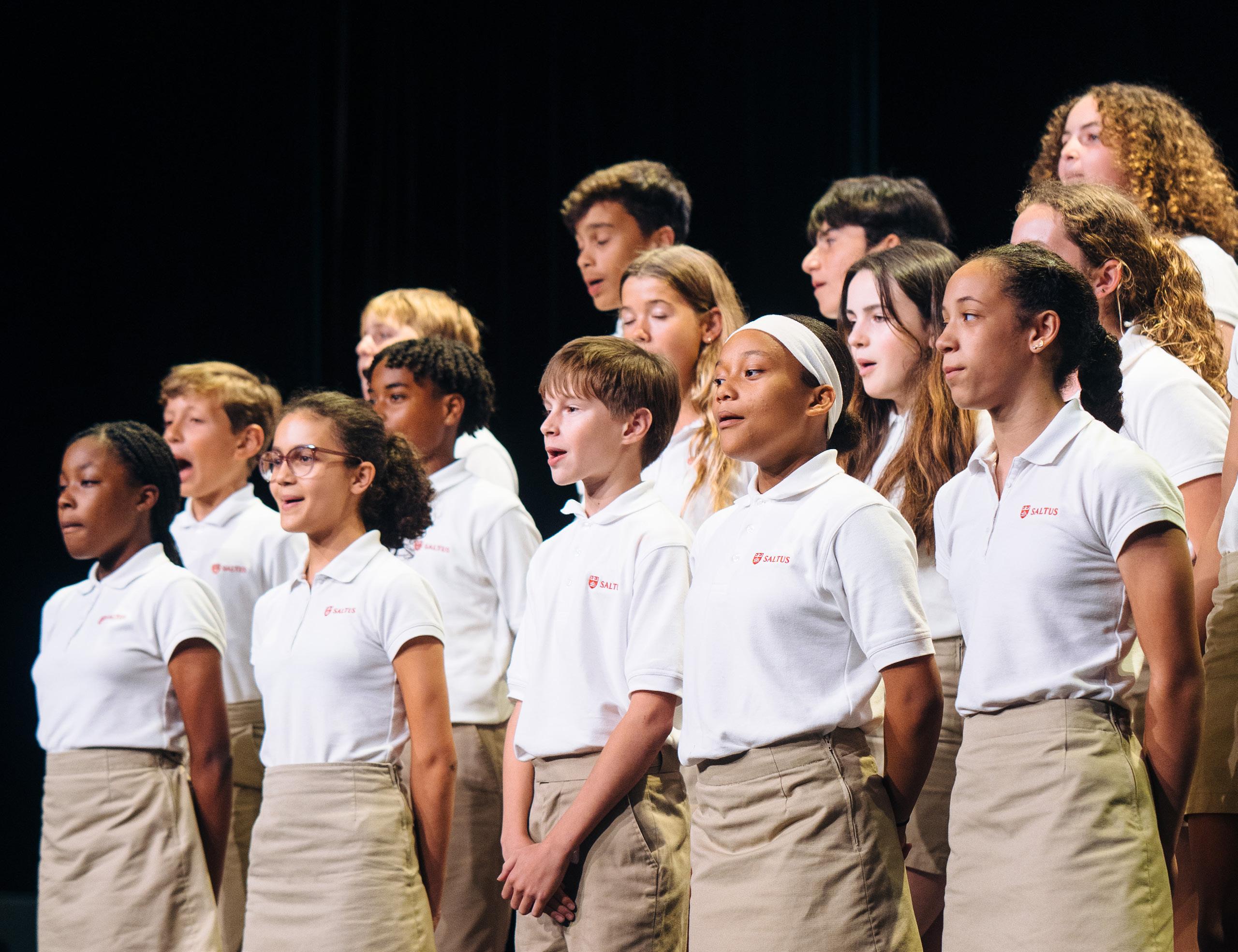
Homework
We set homework that is intentional and may be differentiated. It could be skills practice, reinforcing a concept taught, a question to ponder, or research to conduct at home depending on your child’s learning needs at any given time.
Mathematics and English homework are expected to be done weekly. Science homework will be set regularly. Other homework may be assigned by the teacher when appropriate for skills practice, reinforcing a concept or research.
We do not set homework for one lesson which is due the very next day. Time for completion will be given.
We do not set ‘holiday’ assignments.
Homework will be posted on SaltusLive, with a due date.
If you have questions about your child’s progress, as always please contact your child’s teacher or advisor.
Appropriate tasks for homework:
Tasks should have a clear objective, linked to schemes of work. Subject departments must ensure that homework time is not regularly used simply for finishing off work carried out in class. This can often place too heavy a burden on some children and too light a demand on others. Homework should be suitable for all students concerned.
The three main types of homework are:
Practice exercises - providing students with the opportunities to apply new knowledge, or review, revise, and reinforce newly acquired skills.
Preparatory homework - providing opportunities for students to gain background information on a unit of study so that they are better prepared for future lessons.
Extension assignments - encouraging students to pursue knowledge individually and imaginatively.
The following is provided as a guideline only:
Estimated time per evening 1-2 hours
Maximum total time per week 10 hours 10 hours
Sanctions for failure to complete homework: The completion of homework and the quality of work produced will be closely monitored and recorded by the subject teacher. If a student submits work which is not commensurate with his or her ability or if he or she fails to produce complete homework without good reason, prompt action will be taken.
49
Year
SGY
10/11
2 hours
Where there is no valid reason for a student not to complete homework, the following sanctions will apply.
• If a child is persistent in not doing homework, the class teacher contacts parents to determine the next steps in terms of support.
• If the Year Coordinator notices a pattern of persistent behaviour, they too will contact parents to ensure that the student is supported.
• Students may be placed on a subject or homework report.
Extra-curricular Programmes
In addition to the core programme, Saltus offers numerous clubs and activities to enhance their experience in many valuable ways throughout their Saltus journey. From origami to debating, chess to construction, students can choose an adventure that interests them from a diverse menu of options.
Extra-curricular activities are designed to help students find their passion. Whether based in athletics, service learning, or the range of clubs offered at Saltus; each student has the opportunity to explore options that encourage their creativity and dedication.
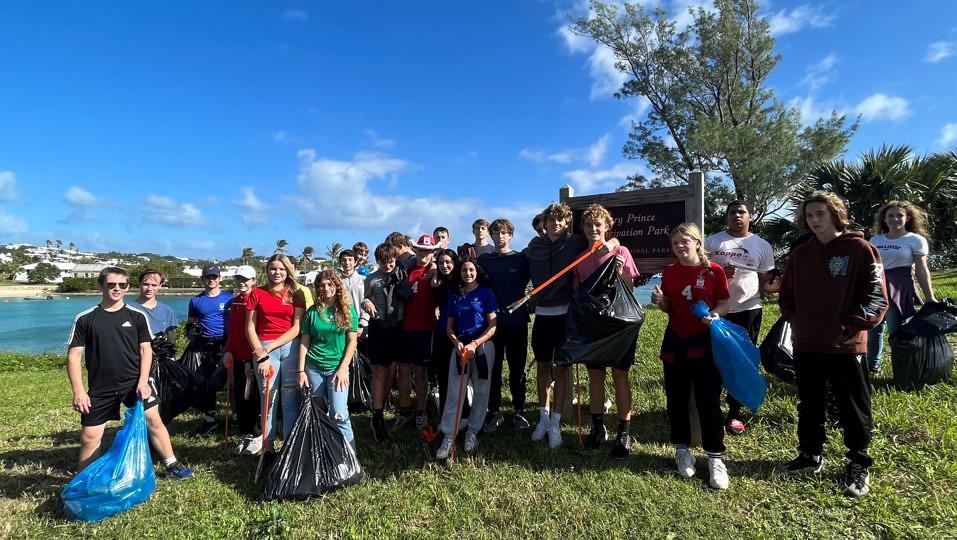
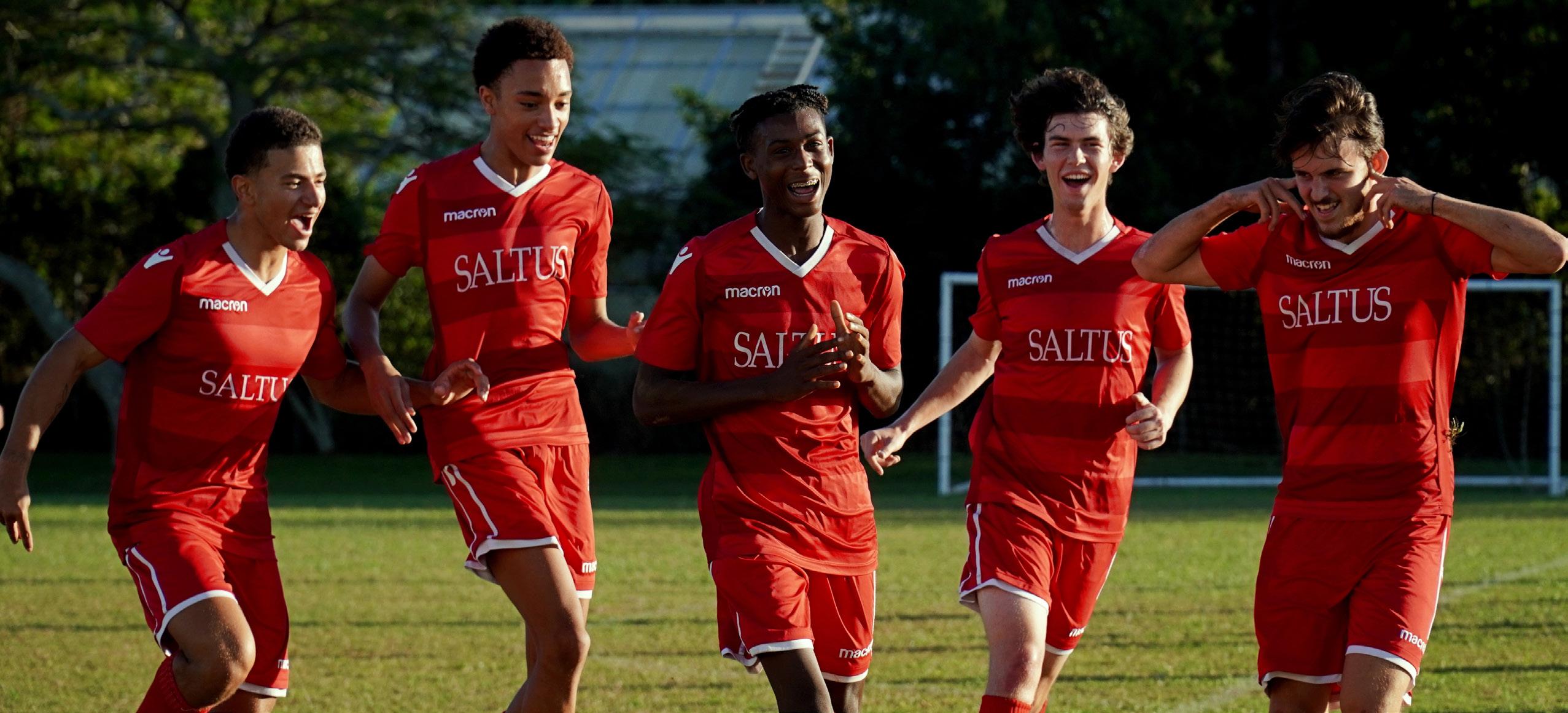
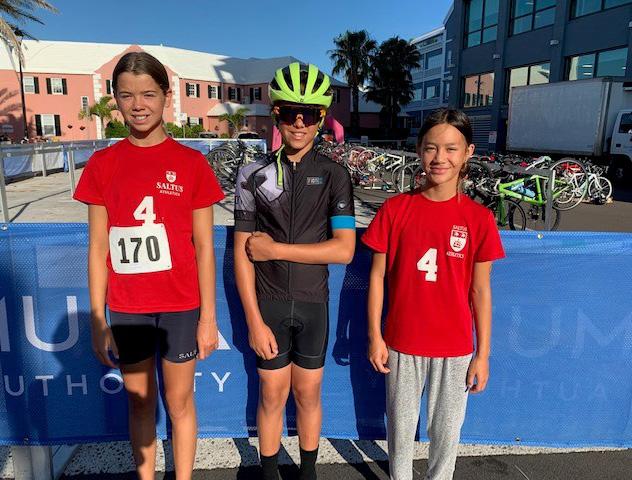

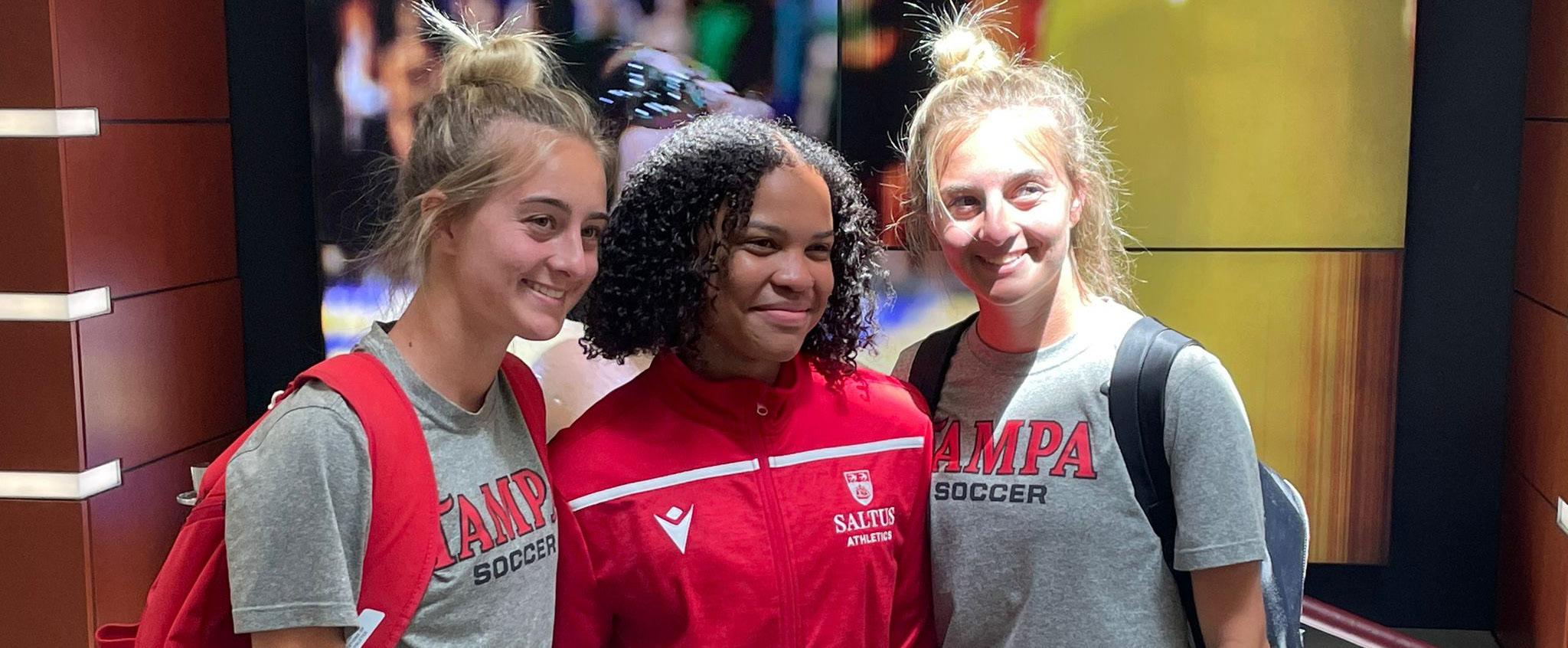
Service Learning
In keeping with our Mission Statement, we consider community service an important part of our programme. By the time students enter the Senior School they will have already made a significant commitment to their community. We hold various events throughout the year to support local and international charities including: The St. Baldrick’s Foundation, Meals on Wheels, Red Cross, St. John Ambulance, SPCA, and many more. There is an expectation that Year 7 students complete 5 hours and Year 8 & 9 students complete 10 hours of community service per academic year. Students in Years 10 and 11 are expected to perform 15 hours of community service a year.
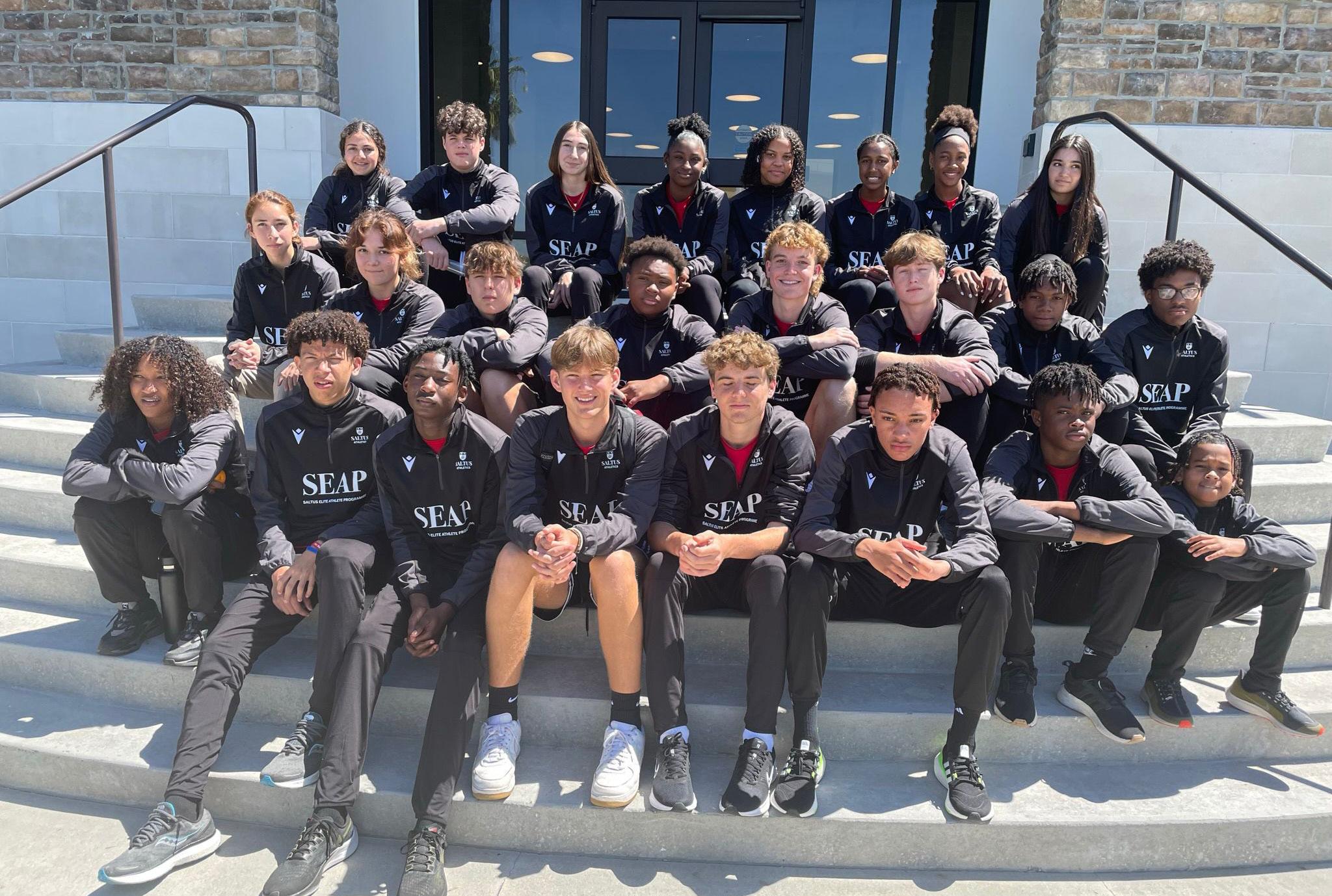
Community service in SGY1 is a requirement of Graduation.
SGY1 students are expected to perform a minimum of 20+ hours although this does not have to be in just one institution/charity. There is an official school form that must be signed by the relevant institution on completion of the service and returned to Advisors.
The Duke of Edinburgh’s Award
Senior School students are given the opportunity to enroll in the highly prestigious Duke of Edinburgh’s Award Scheme. In Year 10 all enrolled students will work towards earning their Bronze Award while the Year 11 students are given the opportunity to earn their Silver Award. Community service hours completed during Duke of Edinburgh will count as their community service requirement.
Guidance
Academic Support and Enrichment
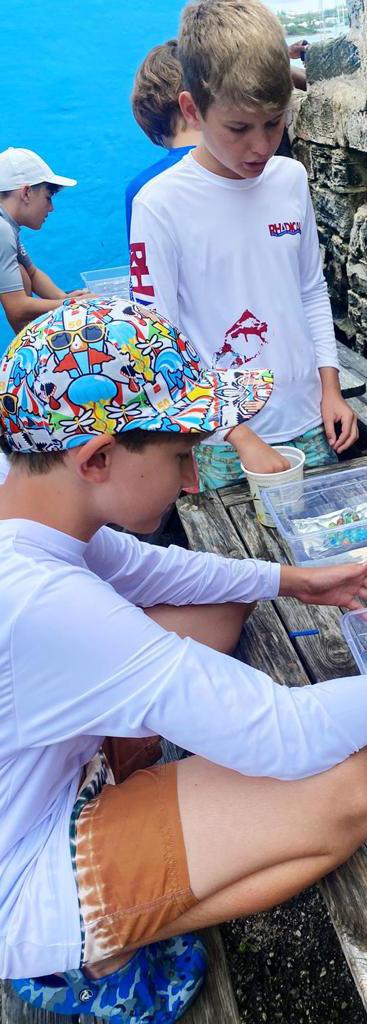
Our Learning Strategist ensures that all students are receiving the necessary tools to best cope with our rigorous curriculum. As we work closely with all of our students to ensure they have the highest possible chance at academic success, there are times where some students may need to receive more focused and individual attention. If you have a concern about your child’s academic progress and believe that he/she has a learning challenge, you are encouraged to contact: Andrée Dugal (andree.dugal@saltus.bm)
School Counsellor
Our School Counsellor, Nic Scanlon, is on-site full time and is available to offer support to our students. He works with our Faculty to ensure that the policies and processes are followed regarding any students who are in need of additional emotional or social support. He has office space at each campus and works closely with the other support services and with the parents. If you have concerns regarding your child, please do not hesitate to contact Nic Scanlon to arrange a meeting at nicholas.scanlon@saltus.bm, telephone 292-6177 ext.6256, cell phone: 535-2847.
University and Careers Guidance Counsellor
Tanja Walker is our University and Careers Guidance Counsellor. She works closely with our Senior students to help them with their course selections. Another of her primary responsibilities is to assist the SGY students/ parents with selecting the right university. She will spend a great deal of time teaching the students how to write applications, perform well in interviews, investigate potential career paths, and, finally, select the right university. Our students are joining highly regarded universities around the world. For more specific information, please contact Tanja Walker at tanja.walker@saltus.bm.
53
Parent Connection Communication
We believe it is important that teachers and parents take shared ownership in the learning and well-being of every student. Communication is highly encouraged and should begin with the student’s classroom teacher. We believe that open communication between teachers and parents will have a positive impact on the student’s overall progress in school. Avenues of communication will include the ‘Week Ahead’, official notes, report cards, and the school website. Conversations will also occur via telephone calls, conferences, and various school-based activities.
As part of our commitment to clear communication with students, staff and parents, we have developed guidelines to ensure that we can meet and manage the expectations of our community. These guidelines are meant to be used in adherence to our Code of Conduct.
Expectations for Parents and Students:
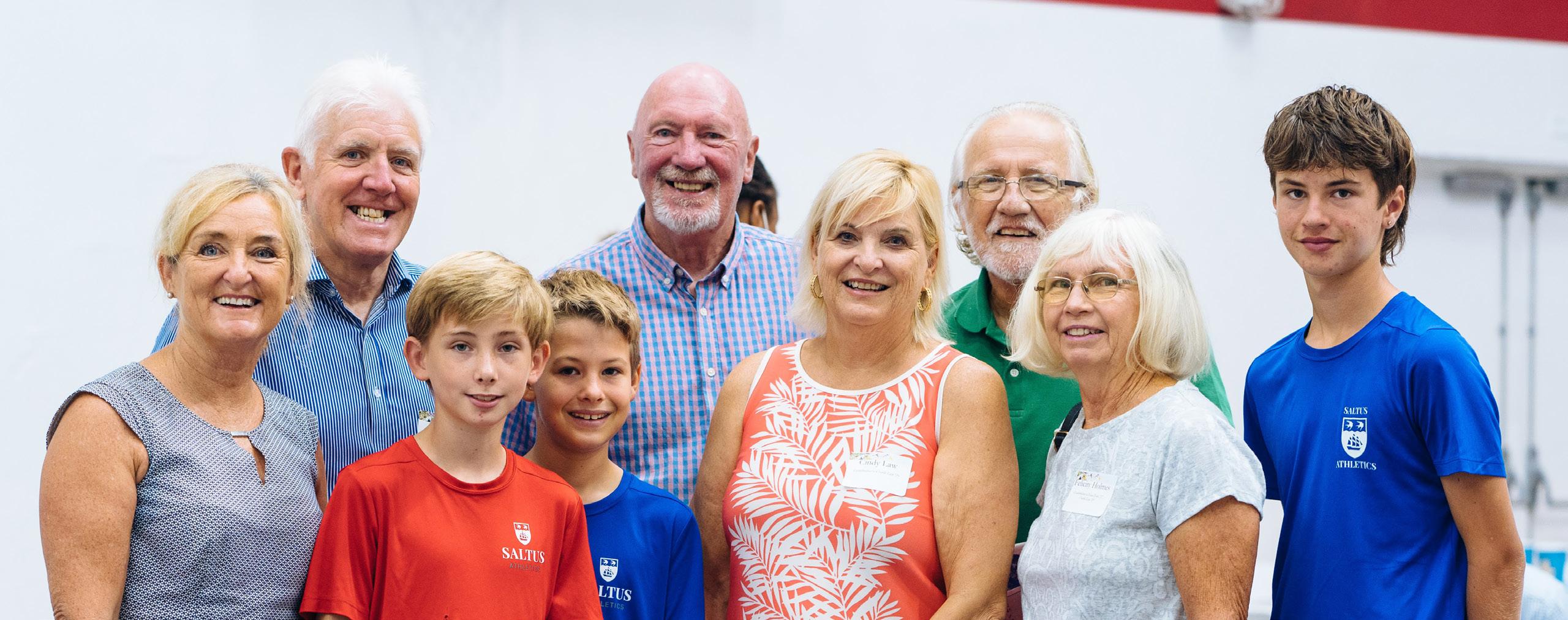
• Our first priority is teaching and learning with our students. Therefore, we have a 24-hour (or a weekend) turnaround time for Faculty and Staff to answer emails.
Faculty and Staff are not required to answer emails in the evening or over the weekend. However, they will be checking them on a regular basis. If parents have an emergency, please contact the appropriate school office.
• A respectful, balanced and healthy approach to communication is integral to our beliefs and values as a school. All members of our community should ‘think before you send’. If your concern is of a sensitive nature, please ask for a face-to-face meeting or a telephone call.
• Faculty and Staff will only use school email addresses to communicate with parents and students. They are not permitted to give out personal contact information.
• When parents have queries regarding a student’s academic courses, the first step is to contact the subject teacher directly. Education is a shared partnership between the parents and the School and we believe that open communication will enhance the student’s progress.
• The digital environment in which we learn means that the school will often publish photos and videos created by and/or containing images of members of our school community (including students).
54
Who to contact at the Senior School If you have a concern relating to:
Your child’s academic performance or classroom issue
The Senior School curriculum
Emergency procedures
Please contact:
The teacher in question and the advisor. If you require further information, you may contact the Year Coordinator
Jesse Sheppard (Director of Curriculum)
Cynthia Hassell (Director of Secondary School)
School time appointments & absence, medical, dental Dejah Denbrook (Administrative Assistant) and/ or the Advisor
School time absences/vacations - planned
School time absences – unplanned (illness etc.)
Athletics
Report Cards
Risk Management
Your son/daughter’s social or emotional wellbeing
Emails/Telephone calls
Teachers’ email addresses are provided in an effort to maintain healthy communication between the School and our parents. If a teacher has a concern, expect a call or email within 24 hours and all other matters, within 48 hours. A meeting after school hours may be requested. Teachers are always available for consultation, given reasonable notice, and welcome the opportunity to meet with parents to discuss students’ progress.
SaltusLive
SaltusLive a single ‘sign-on’ education portal located at www.saltus.bm. Each member of the
Cynthia Hassell (Director of Secondary School)
Attendance - attendance@saltus.bm
Tim Figureido (Director of Athletics)
Your son/daughter’s Year Coordinator
Nadia Robinson (Deputy Head)
Your son/daughter’s Year Coordinator or the School Counsellor
Saltus community (parents, students, alumni, etc.) have an existing record in SaltusLive. Information such as class schedules, school holidays, permission forms, student billing, emergency contact details, grading, and report cards can all be accessed through this portal. Once log-in/access is established users have control over updates to contact information and system settings for email and notifications. To log in click on SaltusLive in the top right corner of the screen at www.saltus.bm.
Guidance is available via a link entitled ‘Forgot login or First time logging in?’ if needed. Should you experience any problems with accessing your account, or need to access historical
55
data, please contact livehelp@saltus.bm or telephone 292-6177 ext. 6287.
Profile Updates
Personal profile data fields, including phone numbers, addresses, etc. in SaltusLive will be
Parent Volunteers
locked in an effort to improve the reliability of information available in our school database. If you would like to make changes to your personal profile at any time, please send an email request to live.profile.changes@saltus.bm and provide the information be updated.
Saltus Association: The Saltus Association is a group of parent volunteers who organise informative and social events that benefit the whole school community. If you are interested to learn more, please contact pta@saltus.bm.
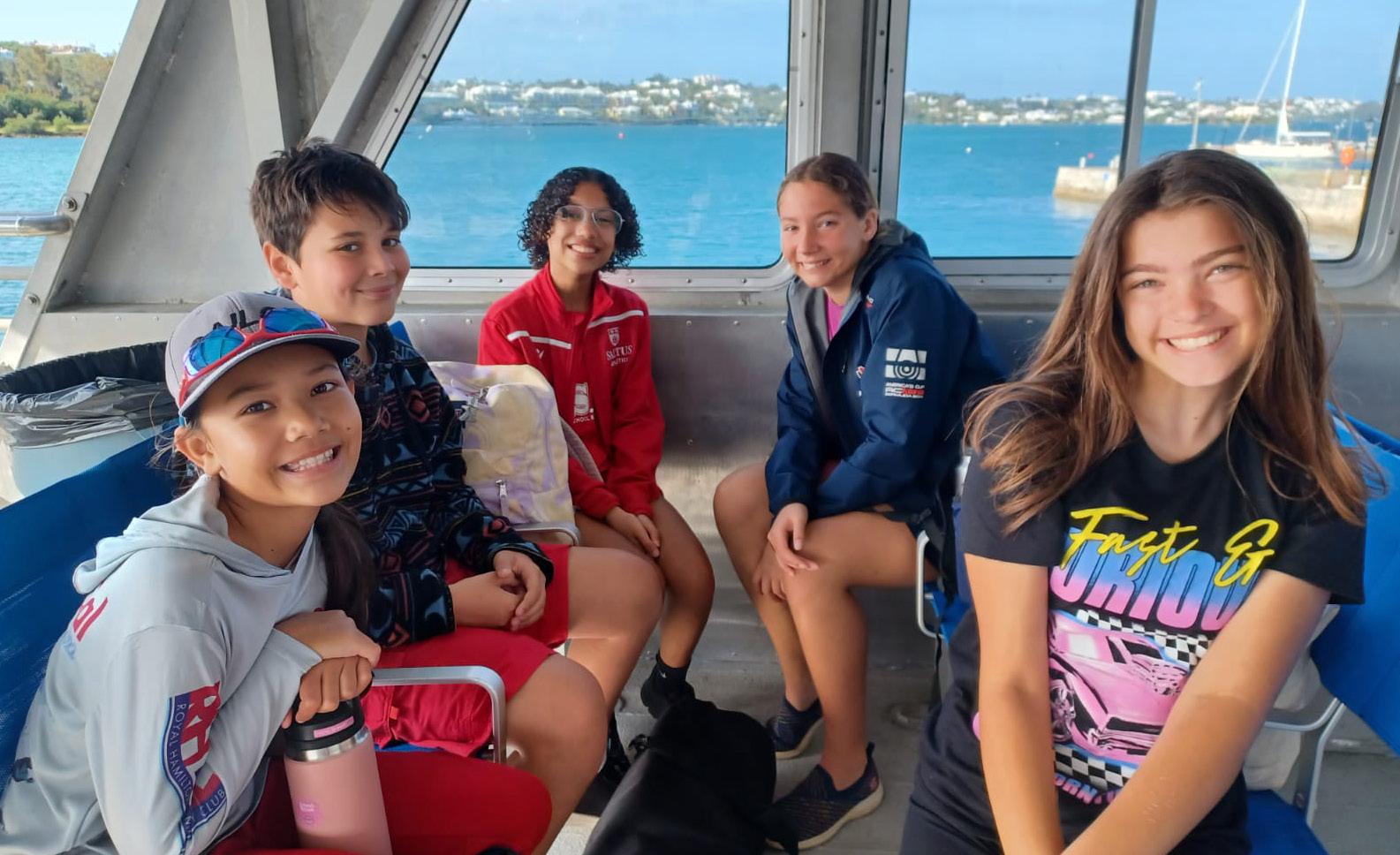
Directory
Please refer to our school directory online at www.saltus.bm for a full list of teachers and staff currently employed by Saltus.
57







































